VocabularyClinic
- 格式:pdf
- 大小:892.85 KB
- 文档页数:24
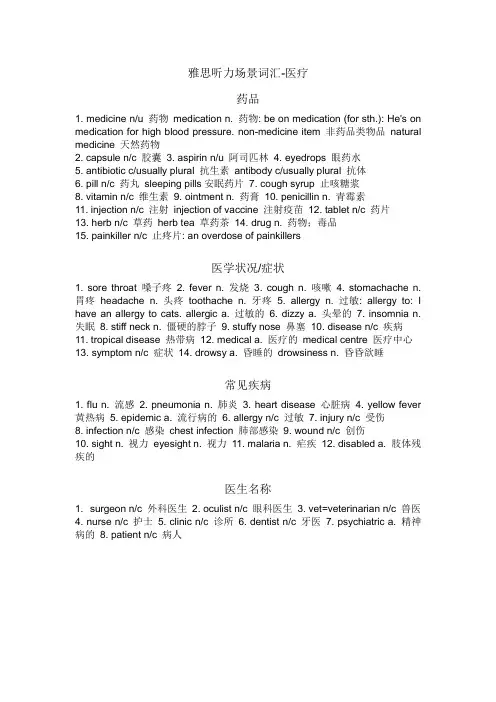
雅思听力场景词汇-医疗药品1. medicine n/u 药物medication n. 药物: be on medication (for sth.): He's on medication for high blood pressure. non-medicine item 非药品类物品natural medicine 天然药物2. capsule n/c 胶囊3. aspirin n/u 阿司匹林4. eyedrops 眼药水5. antibiotic c/usually plural 抗生素antibody c/usually plural 抗体6. pill n/c 药丸sleeping pills安眠药片7. cough syrup 止咳糖浆8. vitamin n/c 维生素9. ointment n. 药膏10. penicillin n. 青霉素11. injection n/c 注射injection of vaccine 注射疫苗12. tablet n/c 药片13. herb n/c 草药herb tea 草药茶14. drug n. 药物;毒品15. painkiller n/c 止疼片: an overdose of painkillers医学状况/症状1. sore throat 嗓子疼2. fever n. 发烧3. cough n. 咳嗽4. stomachache n. 胃疼headache n. 头疼toothache n. 牙疼5. allergy n. 过敏: allergy to: I have an allergy to cats. allergic a. 过敏的6. dizzy a. 头晕的7. insomnia n. 失眠8. stiff neck n. 僵硬的脖子9. stuffy nose 鼻塞10. disease n/c 疾病11. tropical disease 热带病12. medical a. 医疗的medical centre 医疗中心13. symptom n/c 症状14. drowsy a. 昏睡的drowsiness n. 昏昏欲睡常见疾病1. flu n. 流感2. pneumonia n. 肺炎3. heart disease 心脏病4. yellow fever 黄热病5. epidemic a. 流行病的6. allergy n/c 过敏7. injury n/c 受伤8. infection n/c 感染chest infection 肺部感染9. wound n/c 创伤10. sight n. 视力eyesight n. 视力11. malaria n. 疟疾12. disabled a. 肢体残疾的医生名称1. surgeon n/c 外科医生2. oculist n/c 眼科医生3. vet=veterinarian n/c 兽医4. nurse n/c 护士5. clinic n/c 诊所6. dentist n/c 牙医7. psychiatric a. 精神病的8. patient n/c 病人。
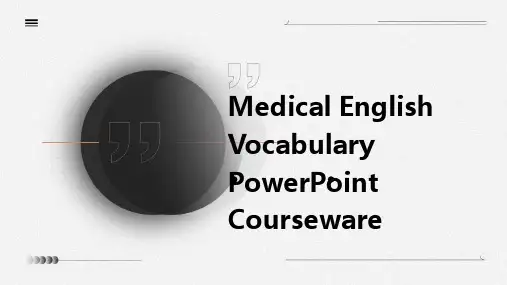
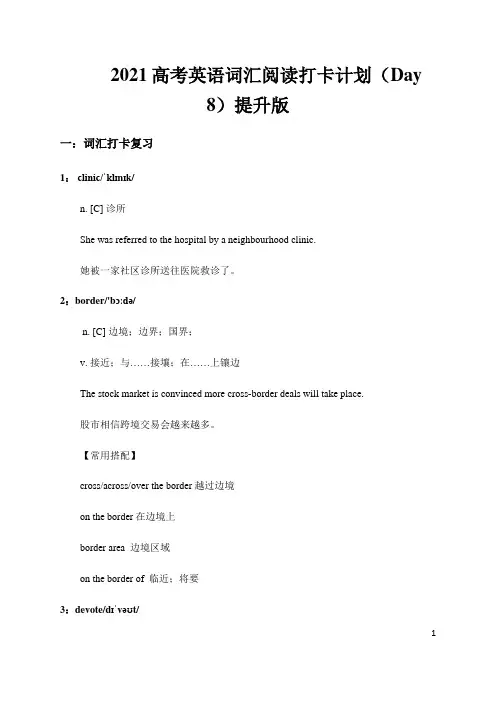
2021高考英语词汇阅读打卡计划(Day8)提升版一:词汇打卡复习1:clinic/ˈklɪnɪk/n. [C] 诊所She was referred to the hospital by a neighbourhood clinic.她被一家社区诊所送往医院救诊了。
2:border/'bɔːdə/n. [C] 边境;边界;国界;v. 接近;与……接壤;在……上镶边The stock market is convinced more cross-border deals will take place.股市相信跨境交易会越来越多。
【常用搭配】cross/across/over the border 越过边境on the border 在边境上border area 边境区域on the border of 临近;将要3:devote/dɪˈvəʊt/1v. 献身;致力;专心;把……用于I feel that I’ve been given a s econd life to devote to something that is meaningful and enormous.我觉得我被赋予了第二次生命,去致力于一些有意义和意义重大的事情。
【常用搭配】devote to 致力于;献身于;投身于【派生词】devotion n. 献身,奉献;忠诚;热爱4:compensate/'kɒmpenseɪt/v. 补偿,赔偿;抵消;付报酬Other people can help us compensate for our mental and emotional deficiencies, much as a wooden leg can compensate for a physical deficiency.其他的可以帮助我们弥补精神和情感上的缺陷,就像木腿可以弥补身体上的缺陷一样【派生词】compensation n. 补偿;报酬;赔偿金5:realistic/ˌrɪəˈlɪstɪk/adj. 现实的;现实主义的;逼真的2Though one should have dreams, it’s not realistic to exist on dreams.尽管人应该有梦想,但是依靠梦想生活也不现实。
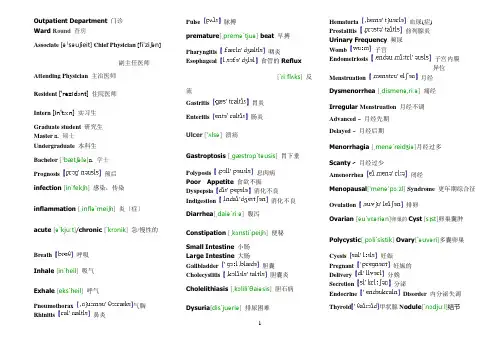
Outpatient Department门诊Ward Round查房Associate [əˈsəuʃieit]Chief Physician [fi'ziʃən]副主任医师Attending Physician主治医师Resident['rezidənt] 住院医师Intern[in'tə:n] 实习生Graduate student研究生Master n. 硕士Undergraduate 本科生Bachelor[ˈbætʃələ]n. 学士Prognosis 预后infection[inˋfekʃn] 感染,传染inflammation[ˏinfləˋmeiʃn] 炎〔症〕acute[əˋkjuːt]/chronic[ˋkrɔnik] 急/慢性的Breath 呼吸Inhale[inˋheil] 吸气Exhale [eksˋheil] 呼气Pneumothorax 气胸Rhinitis 鼻炎Pulse 脉搏premature[ˏpreməˋtjuə] beat 早搏Pharyngitis 咽炎Esophageal 食管的Reflux[ˋriːflʌks] 反流Gastritis 胃炎Enteritis肠炎Ulcer ['ʌlsə] 溃疡Gastroptosis[ˏɡæstrɔpˋtəusis] 胃下垂Polyposis 息肉病Poor Appetite 食欲不振Dyspepsia 消化不良Indigestion 消化不良Diarrhea[ˏdaiəˋriːə] 腹泻Constipation [ˏkɔnstiˋpeiʃn]便秘Small Intestine小肠Large Intestine 大肠Gallbladder 胆囊Cholecystitis 胆囊炎Cholelithiasis[ˏkɔliliˋθaiəsis] 胆石病Dysuria[disˋjuəriə]排尿困难Hematuria 血尿(症)Prostatitis 前列腺炎Urinary Frequency频尿Womb 子宫Endometriosis 子宫内膜异位Menstruation 月经Dysmenorrhea[ˏdismenə,riːə] 痛经Irregular Menstruation 月经不调Advanced ~ 月经先期Delayed ~ 月经后期Menorrhagia[ˏmenəˋreidʒiə]月经过多Scanty ~月经过少Amenorrhea 闭经Menopausal['menə'pɔːzl] Syndrome 更年期综合征Ovulation 排卵Ovarian[əuˋvɛəriən]卵巢的Cyst[sɪst]卵巢囊肿Polycystic[ˏpɔliˋsistik] Ovary[ˋəuvəri]多囊卵巢Cyesis 妊娠Pregnant 妊娠的Delivery 分娩Secretion 分泌Endocrine Disorder内分泌失调Thyroid甲状腺N odule[ˋnɔdjuːl]结节Goiter[ˋɡɔitə]甲状腺肿Hyperthyroidism [ˌhaipə'θairɔidizəm] 甲亢hypothyroidism 甲减Adiposity 肥胖(症)Anesthesia 麻醉Narcosis 麻醉Meningeoma[miˏnindʒiˋəumə] 脑〔脊〕膜瘤Pituitary 垂体tumor垂体瘤Cerebrovascular脑血管的cerebrospinal fluid 脑脊液Ventricle 脑室Spine 脊柱Arachnoid 蛛网膜subarachnoid [ˌsʌbə'ræknɔid]hemorrhage蛛网膜下腔出血Basal[ˋbeisl] ganglia ['gæŋgliə] 基底节internal capsule[ˋkæpsjuːl]内囊anterior[ænˋtiəriə]/posterior[pɔsˋtiəriə]crus[krʌs] of internal capsule内囊前/后角Thalamus (复thalami)丘脑Cerebellum 小脑cerebral infarction [in'fɑ:kʃən]脑梗塞~ embolism[ˋembəlizm] 脑栓塞~ thrombosis[θrɔmˋbəusis] 脑血栓corona[kə'rəunə] radiata['reidieitə]放射冠brain stem[stem]脑干Midbrain中脑Pons[pɔnz] 脑桥Oblongata [ˏɔblɔŋˋɡeitə]延髓Frontal/Temporal[ˋtempərəl]/Occipital[ɔkˋsipitl]/Parietal[pə'raɪətl] lobe[ləub] 额/颞/枕/顶叶Vessel 血管Artery 动脉Arteriography 动脉造影(术)Arteritis 动脉炎Vein 静脉Phlebography 静脉造影(术)Phlebitis 静脉炎Aorta (复aortas,aortae) 主动脉Aortitis 主动脉炎Capillary 毛细血管Arteriosclerosis[ɑ:'tiəriəuskliə'rəusis]动脉硬化Arterio [ɑːˋtiəriə(u)-] Venous ['vi:nəs]Malformation[ˏmælfɔːˋmeiʃən]动静脉畸形Internal Carotid[kəˋrɔtid] Artery(ICA)颈内动脉Anterior Cerebral Artery(ACA) 大脑前动脉Middle Cerebral Artery(MCA) 大脑中动脉Vertebral Artery(VA)椎动脉Posterior Cerebral Artery(PCA)大脑后动脉Posterior inferior[inˋfiəriə]向下的cerebellar[ˏseriˋbelə]Artery小脑后下动脉muscle atrophy['ætrəfi]肌萎缩muscle strength(grade 4)肌力(四级)Electromyography[iˏlektrəumaiˋɔɡrəfi]肌电图muscle tone[təʊn] 肌张力hypotonia[ˏhaipəuˋtəuniə] 肌张力低hypertonia[ˏhaipə(ː)ˋtəuniə] 肌张力高Hyperreflexia[ˏhaipəːriˋfleksiə] 反射亢进Range of Motion运动范围Dysphasia[dis'feiʒiə] 说话困难Dysphagia[disˋfeidʒiə]吞咽困难talipes[ˋtælipiːz]畸形足varus[ˋvɛərəs]内翻的足内翻central nervous system中枢神经系统Parkinson's[ˋpɑːkinsn] diseas帕金森病complete spinal cord transection[trænˋsekʃən] 横切,横断脊髓全横断Hemisection[ˏhemiˋsekʃn]of the cord脊髓半横断poliomyelitis[ˏpəuliəumaiəˋlaitis]脊髓灰质炎syringomyelia[siˏriŋɡəmaiˋiːliə]脊髓空洞症Myasthenia [ˌmaiəs'θi:niə]肌无力Gravis[gravis]重的重症肌无力Multiple Sclerosis [ˌmʌltipəl sklə'rəusis]多发性硬化Tourette syndrome图雷特/抽动秽语综合症peripheral [pə'rɪf(ə)r(ə)l] ~周围神经系统cranial ['kreɪnɪəl]颅的nerves (12pairs) 脑神经Eyelid 睑,眼睑Ptosis[ˋtəusis] 上睑下垂,器官脱垂Diplopia 复视Myopia 近视Eyebrow[ˋaibrau] 眉毛Conjunctivitis 结膜炎Trigeminal [traiˋdʒeminəl] Neuralgia[njuəˋrældʒə]三叉神经痛Disorders of Temporomandibular[tempərəumæn'dibjulə] Joint 颞颌关节紊乱症Spasm[ˋspæzəm]痉挛Chewing 咀嚼Migraine[ˋmaiɡrein]偏头痛Dizziness[ˋdizinis] 眩晕Nausea[ˈnɔ:ziə] 恶心Vomiting ['vɔmitiŋ] 呕吐Vertigo[ˋvəːtiɡəu] 眩晕(旋转)Menier's syndrome美尼尔氏综合症Ataxia[əˋtæksiə] 共济失调Carbamazepine 卡马西平Leukocytopenia [ˏljuːkəˏsaitəuˋpiːniə]白血球减少Insomnia[inˋsɔmniə] 失眠Depression[diˋpreʃn] 抑郁Tinnitus[tiˋnaitəs] 耳鸣Hiccup[ˋhikʌp] 打呃,呃逆Cervical[ˋsəːvikəl]颈Vertebra[ˋvəːtibrə]脊椎Thoracic[θɔːˋræsik] 胸Lumbar[ˋlʌmbə] 腰Sacral[ˋseikrəl] 骶X rays X线Abnormal Curvature[ˋkəːvətʃə] 曲度异常Narrowing of intervertebral[ˏintəˋvəːtibrəl]space椎间隙变窄Hyperosteogeny[ˏhaipəˏrɔstiˋɔdʒini]骨质增生Spinal Medulla[meˋdʌlə]脊髓Intermittent [ˌintə'mitənt] Claudication[ˏklɔːdiˋkeiʃn]间歇性跛行Cotton ['kɔtn] 棉花Spinal Canal[kəˋnæl]管Stenosis[stiˋnəusis]椎管狭窄Bony['bəuni] Spur[spəː] 骨刺Ligament 韧带Calcification 钙化nerve root神经根nerve compression神经压迫Lumbar Spondylolisthesis [spɔndiləulis'θi:sis]脊椎前移腰椎滑脱Prolapse[ˋprəulæps] 脱垂,脱出of LumbarIntervertebral Disc腰椎间盘突出症Sciatica[saiˋætikə] 坐骨神经痛along the course of the sciatic[saiˋætik]nerve 沿着坐骨神经走行Tenderness[ˋtendənis] 压痛Burning Pain灼热痛Radiating ['reidieitiŋ] Pain放射痛Ankylosing[,æŋki'ləuziŋ]Spondylitis[ˏspɔndiˋlaitis]脊椎炎(AS)强直性脊椎炎sacroiliac [ˌsækrəu'iliæk] joint骶髂关节Sacroilitis 骶髂关节炎Rheumatism[ˋruːmətizəm] 风湿病Rheumatoid Arthritis [ˌru:mətɔid ɑ:'θraitis] (RA)风湿性关节炎Gout[ɡaut] 痛风Tophus[ˋtəufəs] 痛风石stiffness[stɪfnis] of the joints 关节僵硬deformity[diˋfɔːmiti] 变形,畸形swelling[ˋsweliŋ] and heat肿胀和发热Osteoarthritis 骨关节炎Osteoporosis [ˏɔstiəupəˋrəusis] 骨质疏松Injury of Meniscus [mi'niskəs] of knee 半月板损伤Heel Pain 跟痛症Fracture [ˋfræktʃə] 骨折internal fixation内固定Stiff Neck落枕(cased by cold or sleeping posture['pɔstʃə] 睡眠姿势)Cervical Spondylosis[ˏspɔndiˋləusis]椎关节强硬颈椎病Rib 肋costal[ˋkɔstəl]肋的chondritis[kɔnˋdraitis]软骨炎肋软骨炎Periarthritis[ˏperiɑːˋθraitis] of Shoudler 肩周炎Tennis Elbow/Internal Humeral [ˋhjuːmərəl] Epicondylitis [ˏepiˏkɔndiˋlaitis]上髁炎网球肘External Humeral Epicondylitis 肱骨内上髁炎Synovitis 滑膜炎Carpal [ˋkɑːpl] Tunnel Syndrome腕管综合征Tenosynovitis[ˏtenəuˏsinəˋvaitis] 狭窄性腱鞘炎waist[weist] 腰lumbar muscle strain[streɪn]腰肌劳损Transverse[træns'və:s] Process[pro·ces s] of ThirdLumbar Vertebra 第三腰椎横突sprain[sprein] 扭伤Piriformis[pirə'fɔ:mis]Syndrome梨状肌综合征Synovitis[ˏsinəˋvaitis]滑膜炎of Ischiac [ˋiskiæk]坐骨的Tubercle['tju:bəkl] 坐骨结节滑囊炎lateral[ˋlætərəl] 外侧的bilateral[baiˋlætərəl] 两侧的medial ['mi:diəl]内侧的,中间的distal[ˋdistl] 远端的proximal[ˋprɔksiməl] 近端的Clavicle 锁骨Scapula ['skæpjulə] 肩胛骨Humerus[ˋhjuːmərəs] 肱骨Ulna[ˋʌlnə] 尺骨Radius[ˋreidjəs] 桡骨Elbow[ˋelbəu] 肘wrist[rist] 腕Pelvis[pelvis] 骨盆Patella 髌骨Calcaneum 跟骨Femur[ˋfiːmə] 股骨Tibia[ˋtibiə] 胫骨Fibula[ˋfibjulə] 腓骨Ankle[ˋæŋkl] 踝Allergy 过敏AllergicDermatitis过敏性皮炎Urticaria[ˏəːtiˋkɛəriə] 荨麻疹Eczema[ˋekzimə] 湿疹Psoriasis[sɔˋraiəsis] 牛皮癣,银屑病Varicose[ˋværikəus] Veins静脉曲张Herpes[ˋhəːpiːz]疱疹Zoster[ˋzɔstə]带状疱疹Girdle [ˋɡəːdl] Pain 带状痛Acne[ˋækni] 痤疮,粉刺Alopecia[ˏæləuˋpiːsiə] 脱发Sensation 感觉,知觉Edema[iˋdiːmə] 水肿Haematoma 血肿Respiration 呼吸Bronchitis 支气管炎bronchopneumonia支气管肺炎Pneumonia 肺炎Tuberculosis 结核(病)Asthma[ˋæzmə]哮喘Germ 细菌Virus 病毒Mycoplasma 支原(质)体Fungus (复fungi)真菌Antibiotic 抗生素Pulmonary Embolism肺栓塞cardiopulmonary 心肺的Electrocardiogram(DCG) 心电图Atrial Fibrillation[fibriˋleiʃn] 房颤Atrioventricular Block房室传导阻滞(AVB)(first degree~)right bundle [ˋbʌndl] block 右束支传导阻滞sinus[ˋsainəs] 窦bradycardia[ˏbrædiˋkɑːdiə]窦性心动过缓sinus tachycardia [ˏtækiˋkɑːdiə] 窦性心动过速supraventricular[ˏsjuːprəvenˋtrikjulə]室上性ventricular [ven'trikjulə] 室性coronary[ˋkɔrənəri] heart disease 冠心病ischemic[isˋkemik] ~ 缺血性心脏病Myocardial [ˏmaiəuˋkɑːdiəl] Infarction[inˋfɑːkʃn] 心肌梗塞angina[ænˋdʒainə] 心绞痛pacemaker[ˋpeismeikə] 起搏器heart bypass surgery心脏搭桥手术(B。
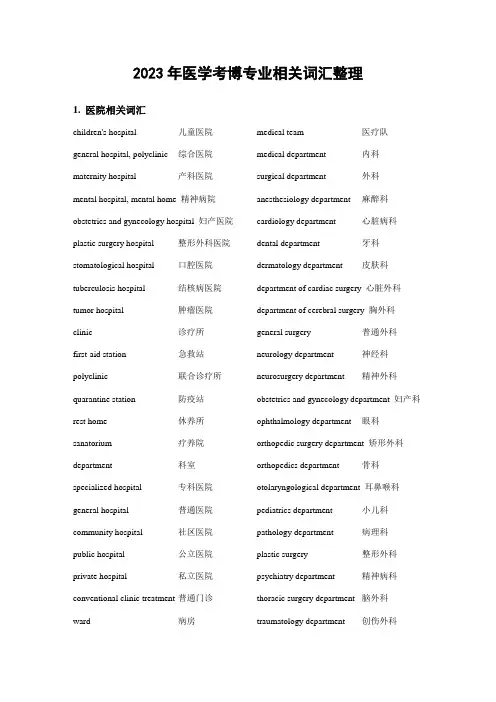
2023年医学考博专业相关词汇整理1. 医院相关词汇children's hospital 儿童医院general hospital, polyclinic 综合医院maternity hospital 产科医院mental hospital, mental home 精神病院obstetrics and gynecology hospital 妇产医院plastic surgery hospital 整形外科医院stomatological hospital 口腔医院tuberculosis hospital 结核病医院tumor hospital 肿瘤医院clinic 诊疗所first-aid station 急救站polyclinic 联合诊疗所quarantine station 防疫站rest home 休养所sanatorium 疗养院department 科室specialized hospital 专科医院general hospital 普通医院community hospital 社区医院public hospital 公立医院private hospital 私立医院conventional clinic treatment 普通门诊ward 病房medical team 医疗队medical department 内科surgical department 外科anesthesiology department 麻醉科cardiology department 心脏病科dental department 牙科dermatology department 皮肤科department of cardiac surgery 心脏外科department of cerebral surgery 胸外科general surgery 普通外科neurology department 神经科neurosurgery department 精神外科obstetrics and gynecology department 妇产科ophthalmology department 眼科orthopedic surgery department 矫形外科orthopedics department 骨科otolaryngological department 耳鼻喉科pediatrics department 小儿科pathology department 病理科plastic surgery 整形外科psychiatry department 精神病科thoracic surgery department 脑外科traumatology department 创伤外科urology department 泌尿科X-ray department 放射科registration office 挂号处out-patient department, OPD 门诊部in-patient department 住院部nursing department 护理部consulting room 诊室waiting room 候诊室admitting office 住院处emergency room 急诊室operation room, operation theatre 手术室laboratory 化验室blood bank 血库pharmacy, dispensary 药房ward 病房medical ward 内科病房surgical ward 外科病房maternity ward 产科病房isolation ward 隔离病房observation ward 观测室hospital bed 病床staff 人员2. 医疗人员职衔职称physician/internist 内科医生oculist/eye doctor 眼科医生surgeon 外科医生general practitioner 全科医生clinician 临床医生dentist 牙科医生orthopedist 骨科医生anesthetist 麻醉师gynecologist 妇科医生dermatologist 皮肤科医生obstetrician 产科医生pediatrician 儿科医生psychologist 心理医生dietician 营养科医生pharmacist 药剂医生family doctor 家庭医生director of the hospital 院长chief of … / professor 主任医生attending/visiting doctor 主治医生resident doctor 住院医生intern doctor 实习医生chief of pharmacy 主任药师associate chief of pharmacy 副主任药师pharmacist-in-charge 主管药师head nurse 护士长nurse-in-charge 主管护士student nurse 实习护士3. 药物词汇drug therapy 药物治疗medicinal herbs 药用草药tablet 药片pill 药丸capsule 胶囊drug therapy 药物治疗side effects 副反映drug abuse 药物滥用drugstore 药房over the counter (OTC) 非处方药drug allergy 药物过敏drug poisoning 药物中毒prescription 处方expenses for medicine 药费charges for medicine 医药费drug rebate 药品回扣penicillin 盘尼西林aspirin 阿司匹林vitamin 维他命antibiotic 抗生素medication 药物gauze 纱布eye drops 眼药pad 药棉块syrup 糖浆mixture 合剂drop 滴剂powder 药粉ointment 药膏stethoscope 听诊器syringe 注射器4. 症状相关词汇symptom 病症have a cold 感冒have a cough 咳嗽have a sore throat 嗓子痛have a stomachache 胃痛have a toothache 牙痛have a fever 发热have a stuffed nose 鼻子不通flu 流感asthma 哮喘pneumonia 肺炎hypertension 高血压diabetes 糖尿病allergy 过敏feel dizzy 头晕stiff 僵硬的twisted/sprained 扭伤的twinge 刺痛sneeze 打喷嚏hiccup 打嗝vomit 呕吐sick 恶心swelling 肿胀bump 肿块ulcer 溃疡infect 传染cramp 痉挛paralysis 麻痹,瘫痪,无能力high fever 高烧chills 发冷sweats 发汗night sweats 盗汗tiredness / fatigue 倦怠insomnia 失眠stiffness in shoulder 肩头发硬sneeze 打喷嚏hiccup 打嗝itch 痒low back pain 腰疼headache 头疼pain (ache) 痛acute pain 急性疼痛severe pain 激痛dull pain 钝痛pressing pain 压痛sharp pain 刺痛piercing pain 戳痛throbbing pain 一跳一跳地痛prickling pain 针扎似的痛burning pain 烧痛tearing pain 裂痛continuous pain 连续痛uncomfortable 不舒适colic 绞痛radiating pain 放射痛sore pain 溃烂痛crampy pain 痉挛痛persistent pain 顽痛slight pain 轻痛bloody urine 血尿blood analysis 验血red cell 红血球white cell 白血球respiration rate 呼吸数expiration 呼气inspiration 吸气difficulty in breathing 呼吸困难irregular pulse 不规则脉搏cloudy urine 尿浑浊glucosuria 糖尿thin, skinny 瘦fat, obese 肥5. 医疗手段medical treatmentsmedical treatment 医疗medical instruments 医疗器械diagnose (v) 诊断(n) diagnosis prevent (v) 防止sterilize (v) 消毒administrate a drug 开药prevent and treat disease (v) 防治疾病TCM 中医chemotherapy 化疗radioactive therapy 放疗medical service 医疗服务complain of (v) 主述health checkup 健康普查diagnosing and treating 诊断和治疗consult the doctor(v) 征询remedy 治疗法anesthetic 麻醉剂local anesthetic 局麻general anesthetic 全麻incidence 发生率mortality 死亡率fatality 致命性morbidity 发病率stethoscope 听诊器first aid 急救therapy 疗法anesthesia 麻醉bandage 扎上绷带dress 包扎diagnosis 诊断discharge from hospital 退院case history 病历admission to hospital 入院soothe 安慰、缓和recover 复原、痊愈X-ray X线MRI 磁共振成像feel one's pulse 测脉搏take one's blood pressure 量血压take one's temperature 量体温give a prescription 开药make up a prescription 配药take medicine/take pills 吃药get an injection/have an injection/打针operation 外科手术transplant 移植手术have an operation 动手术be admitted to hospital入院be discharged from hospital出院6. 医疗体制medical systemhealthcare system 医疗体制medical disputes 医疗纠纷medical accident 医疗事故doctor-patient relationship 医患关系medical insurance system 医疗保险体系medical aid fund 医疗救助基金7. 医德medical ethicsmedical ethics 医德patient-oriented 以病人为核心humanistic 人道主义的compassionate 富于同情性的considerate 体贴周到的resolute 果断的service quality 服务质量7. 各类疾病词汇肺炎pneumonia肝炎hepatitis脑膜炎brain fever/meningitis 膀胱炎cystitis急性胃炎acute gastritis胃炎gastritis支气管炎bronchitis阑尾炎appendicitis胃肠炎gastroenteritis 乳腺炎mastitis肿瘤tumor禽流感bird flu/avian influenza非典SARS (Severe Acute Respiratory Syndrome)疯牛病mad cow disease黑死病black death白血病leukemia爱滋病AIDS (Acquired ImmuneDeficiency Syndrome)流感influenza白内障cataract狂犬病rabies中风stroke冠心病coronary heart disease 糖尿病diabetes肺癌lung cancer肝癌liver cancer肺结核pulmonary tuberculosis 慢性病chronic disease急性病acute disease肺气肿emphysema胃癌cancer of stomach胃病stomach trouble心脏病heart disease并发症complications 高血压hypertension肾病kidney problem糖尿病diabetes肥胖obesity绝症terminal illness不治之症incurable illness癌症初期cancer of early stage癌症晚期cancer of late stage急症emergency case重症serious illness疑难病difficult and complicated cases短气short breath综合症syndrome病程process近视short-sighted (adj)传染病infectious diseases8. 心理健康词汇sub-health 亚健康psychological benefits 心理健康psychological problem 心理问题psychological consultation 心理征询psychological obstacles 心理障碍mental obstacles 心理障碍psychological massage 心理按摩psychology 心理学/ 心理psychotherapy 心理治疗psychological expert 心理专家questionnaire 问卷调查overcome 客服frustration 挫折willpower 意志力、毅力optimism 乐观optimistic 乐观的be sensitive to 对…敏感nervous 神经的stress / pressure / tension 紧张depress / depressed / depression沮丧、抑郁anti-depression drugs 抗抑郁药9. 饮食,营养与健康nutrient 营养素protein 蛋白质fat 脂肪glucose 葡萄糖vitamin 维生素sugar 糖类heat calories quantity of heat 热量carbohydrate 碳水化合物soft beverage 软饮料cholesterol 胆固醇a well-balanced diet 均衡饮食nutrition 营养nutritional 营养的nutritious 有营养的nutritionist 营养学家malnutrition 营养失调metabolism 物质代谢fat free food 无脂食品the prepared food 熟食grain 谷物food shortages 食品短缺breakfast lunch supper 一日三餐imbalance (n) unbalance (a) 失衡10. 生活习惯,运动与健康life-style 生活习惯disorder of body and mind 身心失衡physical and mental disorder 身体/心理失衡quick/high tempo of life 快节奏的生活be accustomed to sth. 习惯…ample sleep 充足的睡眠relax oneself 自我放松physical exercises 体育锻炼entertainment 娱乐sustain the exercise habit 保持锻炼习惯constitution 体质hormone 激素sub-health 亚健康resist mutation 防癌immunomodulator 免疫调节剂enthusiasm 热情11. 听力中的医学词汇ambulance n.救护车belly n.肚,腹部bellyache n.腹痛belly—button n.脐bile n.胆汁bladder n.囊,膀胱.bosom n.胸;内心;胸bowel n.肠;内部cardiogram n.心电图casualty n.伤亡事故;伤亡人员chamber n.议院;腔,心室chemotherapy n.化疗chromosome n.染色体chronic a.慢性的,长期的clone v.克隆cocaine n.可卡因coma n.昏迷constipation n.便秘contaminate v.弄脏,污染cramp n.夹,钳;痉挛,绞痛deficiency n.缺少;营养缺少症diarrhea n.腹泻carbondioxide n.二氧化碳disinfect v.杀菌,消毒drowsy a.昏昏欲睡的;催眠的dysfunction n.功能障碍,功能不良fragrance n.芬芳;香味;香气gastric a.胃的gastritis n.胃炎hepatitis n.肝炎hormone n.荷尔蒙,激素hospitalize v.使住院hypertension n.高血压immunodeficiency n.免疫缺陷;免疫缺损infectious a.传染的,传染性的inpatient n,住院病人insane a.精神错乱的;精神病的inspection n.检查,检查;审查inspire v.使……产生灵感;鼓舞lethal a.致死的,致命的malfunction n.故障;功能碍障medicinal a.药的;药用的;台疗的morphine n.吗啡nausea n.恶心;晕船obesity n.肥胖症scalpel n.手术刀scan v.扫描;审阅;浏览suicide n./v.自杀vaccinate v.接种;种牛痘ward n.看护,监护;病房;监房12. 其他词汇wholesome 有益健康的hygiene 卫生to get vaccinated 接种sick person, patient 病员,患者sickly 多病ailment, complaint 疾病unwell, indisposed 不适的ulcer 溃疡wound 创伤,伤口lesion 损害injury 损伤rash, eruption疹spot 点,斑pimple 丘疹,小疮blackhead 黑头粉刺blister 水疱scab, boil痂scar 癜痕wart 疣,肉赘callus, callosity 胼胝corn 鸡眼chilblain冻疮bruise 挫伤bump 肿块swelling 肿胀contusion 挫伤sprain, twist扭伤fracture 骨折case 病例incubation 潜伏epidemic 流行病fever 热attack, access, fit发作coughing fit咳嗽发作to take to one’s bed 卧床faint 晕厥dizziness 眩晕to feel sick 恶心to lose consciousness 失去知觉concussion 震荡coma 昏迷diet 饮食treatment 疗法to get better, to improve 好转cure 治愈relapse 复发。
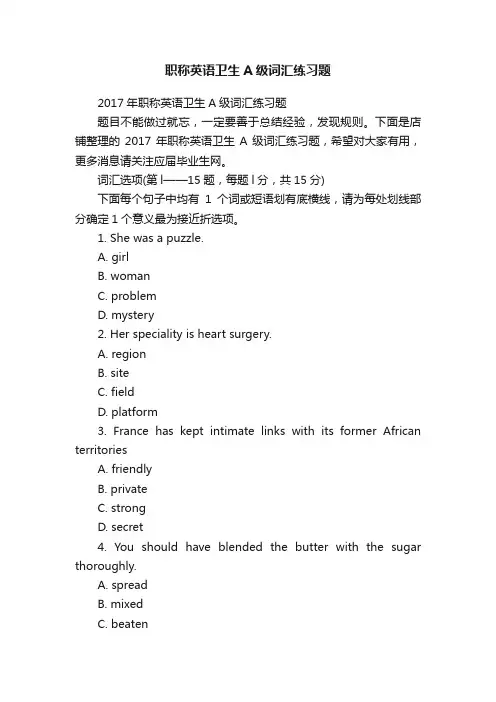
职称英语卫生A级词汇练习题2017年职称英语卫生A级词汇练习题题目不能做过就忘,一定要善于总结经验,发现规则。
下面是店铺整理的2017年职称英语卫生A级词汇练习题,希望对大家有用,更多消息请关注应届毕业生网。
词汇选项(第l——15题,每题l分,共15分)下面每个句子中均有1个词或短语划有底横线,请为每处划线部分确定1个意义最为接近折选项。
1. She was a puzzle.A. girlB. womanC. problemD. mystery2. Her speciality is heart surgery.A. regionB. siteC. fieldD. platform3. France has kept intimate links with its former African territoriesA. friendlyB. privateC. strongD. secret4. You should have blended the butter with the sugar thoroughly.A. spreadB. mixedC. beatenD. covered5. he industrial revolution modified the whole structure of English society.A. destroyedB. brokeC. smashedD. changed6. Tickets are limited and will be allocated to those who apply first.A. postedB. sentC. givenD. handed7. The change in that village was miraculous.A. conservativeB. amazingC. insignificantD. unforgettable8. Customers often defer payment for as long as possible.A. makeB. demanC. postponeD.Dobtain9. Canada will prohibit smoking in all offices later this year.A. banB. removeC. eliminateD. expel10. She read a poem which depicts the splendor of the sunset.A. declaresB. assertsC. describesD. announces.11. From my standpoint., this thing is just ridiculous.A. fieldB. point of viewC. knowledgeD. information12. The latest census is encouraging.A. statementB. assessmentC. evaluationD. count13. The curious looks from the strangers around her made her feel uneasyA. differentB. proudC. uncomfortableD. unconscious14. Reading the job ad, he wondered whether he was eligible to apply for it.A. ableB. fortunateC. qualifiedD. competent15. He was elevated to the post of prime minister.A. pulledB. fortunateC. liftedD. treated参考答案与解析1. C。
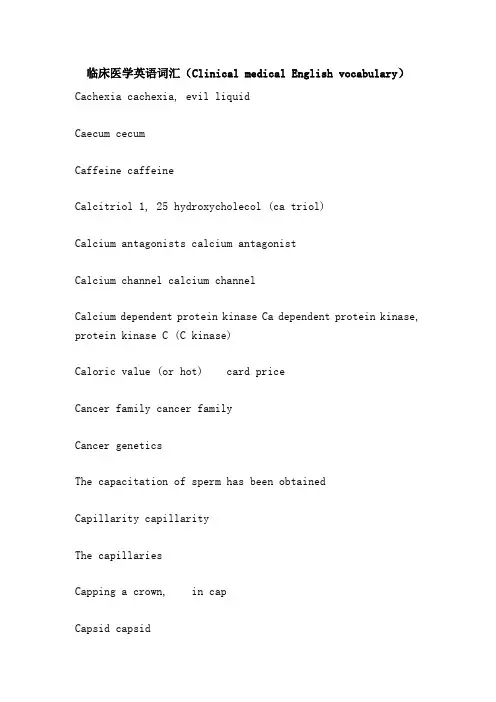
临床医学英语词汇(Clinical medical English vocabulary)Cachexia cachexia, evil liquidCaecum cecumCaffeine caffeineCalcitriol 1, 25 hydroxycholecol (ca triol)Calcium antagonists calcium antagonistCalcium channel calcium channelCalcium dependent protein kinase Ca dependent protein kinase, protein kinase C (C kinase)Caloric value (or hot) card priceCancer family cancer familyCancer geneticsThe capacitation of sperm has been obtainedCapillarity capillarityThe capillariesCapping a crown, in capCapsid capsidPressure capsular pressure within the renal capsule Capsule capsule, membrane, cystCaptopriil captoprilCarbamazepine carbamazepineCarbenicillin, benzylpenicillinCarbidopa carbidopaCarbimazole carbazoleCarbohydrate sugarCarcinogenicity carcinogenicityCarcinoid carcinoidCarcinoma of thyroid carcinoma of the thyroid gland Carcinoma cancerCardiac apex apexCardiac asthmaCardiac glycosideCardiac insufficiency cardiac insufficiencyCardiac orifice cardiaCardiac reserve heart reservesCardiac heart tube tubeCardiac work heart workCardiogenic plateCardiomyopathy cardiomyopathyCardiovascular pharmacology cardiovascular pharmacology Carnification fleshyCarnitine carnitineCarotid body carotid body, carotid ballCarpal canal carpal tunnelCarpus carpal boneCarrier protein carrier proteinCarrier carrier, carrier, carrier, carrier, insectThe cartilage capsule of the cartilage capsuleThe cartilage lacuna of the cartilage lacuna Cartilage chondrocytesCaseous necrosis of caseous necrosis Caseous pate tuberculosisCat cry syndrome is called syndrome Catabolism catabolism, disassimilation Catalase, catalase, catalaseCatecholamine catecholamineThe subject is emptyCedilanid sildenafilCell adhesion cellsThe cell biology of cell biologyIs outside the cell coat cellsCell communication cell communicationCell culture cell culturecell differentiation cell differentiationCell electrophoresis cell electrophoresiscell fusion cell fusionCell junction cell junctionThe cell effort kinetics cell proliferation dynamics cell effort cell proliferationCell recognitionThe cell surface antigen cell surface antigenThe cell and found cell theoryThe cell cellCellular edema cell edemaCentral arteryCentral gray. Central grayCentral nervous system central nervous systemCentral stimulant central stimulantCentral vein central veincentric ring centromere ringCentriole centrioleCentroacinar cell bubble heart cellCentromere centromere, centromere, centromere Centrosome centrosomecephalic phase first periodCephalin cephalinCercaria cercariaCercarial dermatitis sexual dermatitisCerebral circulation, cerebral circulationDark adaptation dark adaptationDarkfield microscope for dark visionDaughter cyst ascusDE novo synthesis is made from scratchDead space like ventilation dead space ventilationDecidua basalisDecidua is the capsule laris bagDecidua parietalis wall decidual membrane Decidua decidualTo differentiate dedifferentiation Defective virusDeformation anomalyDegeneration, degenerationDegradation degradationDegranulation degranulationDehydration dehydrationDeletion is missingDenaturation degenerationDendrite dendriticDense connective tissueDental pulp pulpDeoxycholic acid deoxycholic acid Deoxyribonucleotide deoxyribonucleotide Depolarization in addition to the class Depression suppression, decompressionDepressor reflex depressor reflexThe dermis leatherdesmin filament knot protein fiberdesmin junction proteinsDesmosome desmosomesdetermination decisiondeterministic effect positive effect Detoxification detoxification and detoxification Development and developmentDexamethasone dexamethasoneDialysis dialysisDiandry double male fertilizationDiaphragm diaphragmaticDiastole diastolicDiastolic pressure diastolicDiazepam stabilityDiazoxide diazoxideBecause of dicaineDichroic ratio dichroic ratioDicoumarol bicoumarinDielectric polarization of the dielectric polarization Dielectric dielectric (insulator)Diencephalon diencephalonDifferential medium identifies the mediumDiffraction of the wave wave diffractionDiffuse glomerulonephritis diffuse glomerular nephritis coursing together impairment dispersion disabilitiesCoursing together diffusion, dispersionDigestants bromoDigestion digestionDigestive system of digestive systemDigitalis digitalisDigitoxin is digitoxinDigoxin digoxinDigyny double female fertilizationDihydroxyacetone phosphate dihydroxy acetone phosphate Diltiazem, sulfurdiluted urine diluted urineDimefline dimeflineDimension dimensionalDiopter diopterDiphenhydromine benadryl benadryl benadryl benadrylDipole momentDipole dipoleDirect effect role directlyDiscrete copy discontinuous replication Diseases, diseasesDisinfection disinfectionDistribution distributionDisulfide bond disulfide bondDiuretic diureticsDobutamine dobutamineDocking protein anchor protein, protein docking Domain, domain, functional areaDonor site for aDonor donorDorsal aorta with aortaDosage doseDot blot dot hybridization methodDouble helix double helixDouble uterusThe down regulator regulate attenuation Conduction effect dromotropic action Droperidol fluperidolDroplet transmission droplets spreadDrug abuse drug abuseDrug dependence is drug dependenceDrug enzyme medicine enzymeDrug metabolismDrug resistanceDrug drugDry gangrene dry gangreneDuct catheterDuctus arteriosus arteriosusDuctus deferensDuodenal ulcer duodenal ulcerDuodenum duodenumDuplication repeatDura mater epiduralProtein dynein protein, dyneDysplasia was stuntedDyspnea has difficulty breathingCardiac hypertrophy eccentric hypertrophy Eclipse period eclipse periodEcology ecologyEcosystem ecosystemEctoderm ectodermEctoderm ectodermEctopic kidney and kidneyEctopic parasitismEdema edemaEffect effectThe effective dosed effective doseThe effective filtration pressure filtration pressure effectivelyEffector effector, effectorEfferent nervous systemEfficacy and effectivenessEgg eggejection phase ejection phaseElastic carotid arteryElastic cartilageElastic fiber elastic fiberelastic to hold elastic resistanceElasticity elasticElastin elastinelectric current density current densityThe electric current currentElectric dipole moment electric dipole momentElectric dipole electric dipoleThe intensity of electric field intensity of electric field (field)electric field, electric fieldElectric flux electric fluxElectric potential difference potential differenceThe electric potential energy potential canThe electric potential potentialThe electric susceptibility electric susceptibilityElectrical coupling electric couplingElectrical synapseElectrocardiogram ecgElectrochemical gradient electrochemical gradient Electromagnetic induction electromagnetic induction Electromagnetic wave, electromagnetic waveelectromotive force electromotive forceElectron capture electron captureElectron pair production electron pair generation Electrophoretic mobility electrophoresisElephantiasis elephantiasisElimination rate constantelliptically polarized light ellipse polarized light Elongation extendedEmbolism embolismEmbolus embolusEmbryology embryologyEmbryonic disc blastodermInduction of embryonic induction embryos Emission spectra emission spectraEmphysema emphysemaEnamel enamelSurrounded by encapsulationEnd cell terminal cellEnd feet feetEndemic goiter endemic goiterEndocardium endocardiumEndocrine glandEndocytosis endocytosis, endocytosis, endocytosis Endomembrane systemEndometrium endometriumPeptidase endopeptidaseEndorea replicationendosome intracellular bodyEndothelium endothelialEndotoxin endotoxinenergy density energy densityenergy flux can flowEnergy level levelenergy metabolic rate of energy metabolism rate energy metabolism energy metabolismEnhancer enhancerEnolphosphopyruvate phosphoenolpyruvateEnteric nervous system enteric nervous system Enterobiasis enterobiasisEnterogenous cyanosis enterogenous purple purple Enterotoxin enterotoxinEnterovirus enterovirusEnvelope envelopeEnzyme enzymeEpendymal cell membrane cellEphedrine ephedrineEpicardium epicardialEpidemic fever, gic fever, epidemic hemorrhagic fever Epidemic meningitisEpidermis cuticleEpididymal ductEpithelial reticular cell epithelial reticular cells Epithelial tissue epithelial tissueEpithelioid cell epithelial cellsEpitope epitopecontinuity equation of continuity equationThe equilibrium potential equilibrium potentialThe equilibrium state of equilibriumEquipotential surface equipotential surfaceErosion corrosionErythrocyte sedimentation rate erythrocyte sedimentation rateErythrocytic stageErythropoietin erythropoietin, erythropoietinEssential amino acid essential amino acidEssential fatty acid essential fatty acidsEstrogen estrogenestrus cycle estrus cycleEthambutol ethyl amine butanolEthosuximide ethosuximideEtiological treatment of etiological treatmentEtiology etiologyEuchromatin euchromatinEugenics eugenicsEuphoria euphoriaeupnea quiet breathingThe evolution of evolutionExchange swap content hypothesisExcitability excitatoryExcitable cell excitable cellsOrganization excitable tissue can be excitedThe excitation spectra excitation spectrumExcitation excitation, excitementExcited state excited stateexcitement excitedExcretion secretion and excretionExcretory system drainage systemExocrine gland exocrine glandExocytosis cell vomit, cell crack outside, outside work vomitExogenous pyrogenExon exonsPeptidase exopeptidaseExotoxin exotoxinExperimental animal model induced animal modelExhale expirationExposure rateExposure exposureExternal ear outer earExternal environment outside environmentExternal exposure external exposureExternal, the ge is out of the bloodExternal respiration external respirationExtra muscle spindle muscle spindleextrapolation number extrapolation valuesExtrinsic or peripheral protein or peripheral proteinExudate exudate Exudation ooze blood Eyeball eyeball Eyelid eyelid。
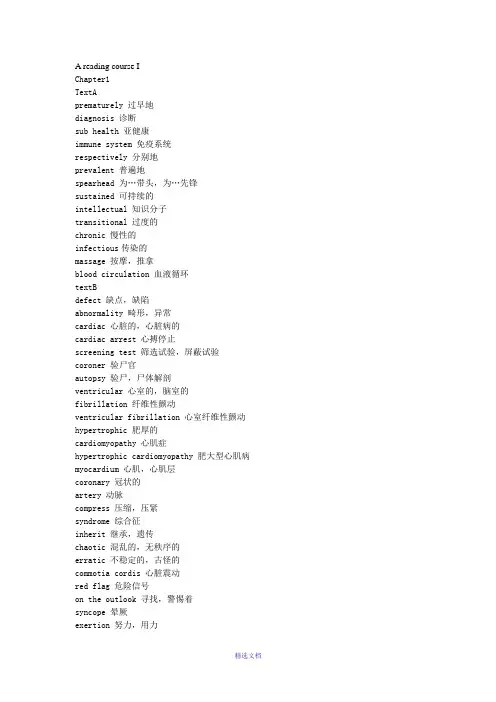
A reading course IChapter1TextAprematurely 过早地diagnosis 诊断sub health 亚健康immune system 免疫系统respectively 分别地prevalent 普遍地spearhead 为…带头,为…先锋sustained 可持续的intellectual 知识分子transitional 过度的chronic 慢性的infectious传染的massage 按摩,推拿blood circulation 血液循环textBdefect 缺点,缺陷abnormality 畸形,异常cardiac 心脏的,心脏病的cardiac arrest 心搏停止screening test 筛选试验,屏蔽试验coroner 验尸官autopsy 验尸,尸体解剖ventricular 心室的,脑室的fibrillation 纤维性颤动ventricular fibrillation 心室纤维性颤动hypertrophic 肥厚的cardiomyopathy 心肌症hypertrophic cardiomyopathy 肥大型心肌病myocardium 心肌,心肌层coronary 冠状的artery 动脉compress 压缩,压紧syndrome 综合征inherit 继承,遗传chaotic 混乱的,无秩序的erratic 不稳定的,古怪的commotia cordis 心脏震动red flag 危险信号on the outlook 寻找,警惕着syncope 晕厥exertion 努力,用力seizures 癫痫,痉挛screening 筛选asthma 哮喘,气喘implantable 可移植的,可植入的cardioverter 心律转变器,复律器defibrillator 去纤颤器,电震发生器pacemaker 心律调整器,起搏器arrhythmia 心律不齐,心律失常electrocardiogram 心电图Vocabularysub health亚健康massage 按摩,推拿diagnosis 诊断suffernegativeaccelerateinfectioncirculationhealthcaredefectinheritcardiactriggerabnormalitysurgeryscreeningsignaldisordersyndromeprematurechapter2TextAdrug resistance耐药性Aids 艾滋病tuberculosis 肺结核malaria 疟疾scourge 灾祸,苦难的根源penicillin 盘尼西林antibiotic 抗菌素incentive 动机,刺激institution 公共机构,习俗leadership 领导能力,领导surveillance 监督,监视priority 优先,优先权,优先考虑的事hygience 卫生,卫生学lancet 小刀,柳叶刀haemorrhage 大出血tranexamic acid 氨甲环酸malnutrition 营养不良soaring 高耸的,猛增的depletion 消耗,放血stock 库存,血统textBallergy 过敏症,反感allergic 对…过敏/极讨厌的side effect 副作用sulfa 磺胺的,磺胺药剂的immune 免疫的offending 不愉快的medication 药物,药物治疗adverse 不利的,相反的itchy 发痒的,渴望的rash 皮疹hives 荨麻疹,假膜性喉头炎exposure 暴露,揭露anaphylaxis 过敏性,过敏性反应prescription 药方,指示symptom 征兆,症状wheeze 喘息serum 血清,浆液injection 注射,注射剂foreign 外国的,异质的medical facilities 医疗设施latex 乳胶,乳液application 应用,敷用amoxicillin 阿莫西林,氢氨苄青霉素ampicillin 氨苄西林,氨苄青霉素augmentin 安灭菌,奥格门汀carbenicillin 羧苄青霉素dicloxacillin 双氯西林,双氯青霉素cephalosporin 头孢菌素cefaclor 头孢克洛,氯氨苄青霉素cefadroxil 头孢氢氨苄cefepime 头孢吡肟cefprozil 头孢丙烯cephradine 头孢拉啶,先锋霉素cephalexin 头孢氨苄sulfasalazine 柳氮磺胺吡啶Bactrim 复方新诺明sulfate 硫酸盐insulin 胰岛素manifest 证明,表明iodine 碘,碘酒bloodstream 血液,血液的流动vessel 脉管,血管nausea 恶心,晕船,极端的憎恶vomit 呕吐,吐出dizziness 头晕,头昏眼花Vocabularysymptioninsulinsurveillancedizzinessimmuneallergicresistancemalariasulfaantibioticitchyforeignvomitbloodstreaminjectionhygieneprescriptionasthmahealthcareanaphylaxicchapter3textAhospice 临终关怀,临终关怀医院catch on 变得流行terminally 不治地,晚期地allusion 暗示,提及influential 有影响的decent 体面的,像样的prolong 延长,拖延existence 生存,生活intervention 干预,介入hostile 敌对的,怀敌意的dedicate 致力,献身explicit 明确的,清楚的intervene 干涉,插入palliative 缓和剂,暂时姑息outstrip 超过,胜过expectancy 期望,期待predictable 可预言的geriatrics 老年病学,老年病人succumb屈服,被压垮dementia 痴呆decay 衰败,衰退textBswallow 吞下,咽下stressful 紧张的,有压力的appreciate 欣赏,感激pursue 继续,从事alternative 选择,替换物available 可得到的,可利用的caregiver 照料者,护理者mission 使命,任务knowledgeable 知识渊博的,有见识的approach 接近expertise 专门知识,专家意见incredibly难以置信地distress 使悲痛,使贫困anticipate 预期,期望compassionate 慈悲的,富于同情心的participation 参与,分享excel 优于,胜过,擅长Vocabularyimmortalterminaldementiahospicedecentanxiousexpectancycaregiverpositiveapproachguidancepursuemissioninterventionemotionalalternativegrievefuneralphysicaltubechapter4textAface lift 面部拉皮手术deposit 沉积物cosmetic 美容的,化妆用的endoscopic 内窥镜的,用内窥镜检查的incision 切口,切割contour 轮廓,周线bandage 绷带wrinkle 皱纹crease 折痕,皱纹swelling 肿胀,增大restrict 限制,约束minimal 最小限度的,极小的invasive 侵略性的,攻击性的invasive surgery 侵入性外科手术anesthesia 麻醉sedation 镇静的,镇静剂visibe 明显的,看得见的temple 太阳穴textBlaser 激光remedy 补救,治疗hyperpigmentation 色素沉着过度discolor 使变色,使褪色discoloration 变色dermabrasion 磨去皮肤疤痕之手术,磨皮手术acne 痤疮,粉刺ablative 烧蚀的vaporize 汽化,使…蒸发downtime 停工期collagen 胶原,胶原蛋白pulse 脉冲,脉动rejuvenation 返老还童,恢复活动sagging 松垂的,下沉的vascular 血管的,淋巴管的lesion 病变,损伤antiviral 抗病毒物质antibacterial 抗菌剂,抗菌药yeast 酵母complication 并发症intravenous 静脉内的penetrate 渗透,穿透ointment 药膏,软膏petroleum jelly 凡士林,矿油temporary 暂时的,短暂的dormant 休眠的,静止的herpes 疱疹Vocabularyendoscopicmedicationcomplicationantiviralwrinkleanesthesiavascularswellingexposurehyperpigmentationscarinvasiveintravenouspeeldermabrasiondormantincisiondepositlesioncollagenchapter5textAgenetic 遗传的,基因的loom 可怕地出现,令人惊恐的隐现invade 侵入,侵略staple 主要的,常用的biotechnologist 生物工艺学家estimate 估计ingredient 材料,原料reveal 显示,透漏domesticated 家养的toxicity 毒性,毒性作用,毒性反应allergenicity 变应原性,过敏反应antibiotic 抗生的,抗菌的extinction 灭绝hazardous 有危险的,冒险的tangle 纠纷,混乱状态anomaly 异常,反常事物jurisdiction 管辖权haphazard 随便的,无计划的contaminate 污染,弄脏legislation 立法negligence 疏忽,忽视biotechnology 生物技术,生物工艺学textBaccess 使用权,接近或享用的机会temporarily 临时地affordable 负担得起的shortage 缺乏utilize 使用,利用household 家庭的,日常的intellectually 智力上,理智地resource 资源effective 有效的fertilizer 化肥productive 能生产的,多生产的deterioration 恶化undertake 承担,从事resistance 抵抗,反抗cultivate 培养,耕作cubic 立方体的,立方irrigation 灌溉salinisation 盐渍化consequently 因此,结果enhance 提高,加强invest 投资cyclone 旋风,气旋,飓风flee 逃走,消失,消失debris 碎片,残骸prioritise 给予…优先权,按优先顺序处理quarantine 检疫tariff 关税表,收费表subsidise 资助给…补助金deprive使丧失,剥夺Vocabularyorganismtanglecondimentfertilizershortagecontaminateanomalydebrisbacteriaregulateaccesstariffingredientprioritiseextinctiondeteriorationhaphazardirrigationpandemicutilizationchapter6textAwillpower 意志力,毅力illicit 违法的,非法的staggering令人惊讶的deleterious 有毒的,有害的disintegration 分解,瓦解chronic 慢性的,长期的relapse 旧病复发,故态复萌counteract 抵消,中和disruptive 破坏的,分裂性的psychiatric 精神病学的,精神病治疗的diabetes 糖尿病,多尿症reinstate 使恢复,使复原textBgay teen 同性恋青少年acute 严重的,急性的lesbian 女同性恋bisexual 双性恋的transgender 跨性别者,变性人heterosexual 异性的,异性恋的subgroup 子群straight teen 异性恋青少年,非同性恋青少年homophobia 对同性恋的恐惧,对同性恋的憎恶victimization 欺骗,侵害disparity 不同,不一致marginalize 排斥,使处于社会边缘nongovernmental 非政府的harassment 骚扰,烦恼marijuana 大麻,大麻毒品cocaine 可卡因methamphetamine 甲基苯丙胺,冰毒assault 攻击,袭击pseudonym 笔名,假名stigmatization 污辱adolescent 青少年prognosis 预后,预知grim 冷酷的,糟糕的homophobic害怕同性恋的imperative 必要的,紧急的confidential 表示信任的Vocabularyabsueaddictionillicitchronicdeleteriousstaggeringrelapsedisruptivedisintegrationhomophobiabisexualacutedisparityprognosispseudonymassaultimperativeasthmavictimizationchapter7textAeligibility 合格,资格dialysis 透析transplant 移植renal 肾的premium保费eligible 合格的,符合条件的coverage 承保范围labor 分娩,生产delivery 分娩textBbone mass 骨质osteoporosis 骨质疏松cardiovascular 心血管的cholesterol 胆固醇lipid 脂类triglyceride 三酸甘油酯colorectal 结肠直肠的fecal 粪便的,排泄物的occult 隐性的sigmoidoscopy 乙状结肠镜检查colonoscopy 结肠镜检查barium 钡enema 灌肠,灌肠剂dyslipidemia 血脂异常obesity 肥胖gestational 妊娠期的glaucoma 青光眼hepatitis肝炎pelvic 骨盆的cervical 子宫颈的vaginal 阴道的referral 转介,转诊pneumococcal 肺炎球菌的prostate 前列腺rectal 直肠的mammogram 乳房X线照片cessation 停止,休止chapter8textAspinal 脊髓的,脊柱的diverse 不同的,多种多样的gratifying 悦人的,令人满足的assume 承担rehabilitation 康复,修复physical rehabilitation 物理疗法,物理治疗accredited 公认的,经过认证的supervised fieldwork 实习pinpoint 精确地找到,查明per diem 每天,按日textBneurological 神经病学的substantiate 证实aphasia 失语症trigger 引发,引起innately 天赋的,与生俱来的attune to 习惯于bradykinesia 云动徐缓,动作迟缓initiate 开始,发起cadence 节奏,韵律organized 安排有秩序的,做事有条理的cofounder共同创始人synchronize 使同步,使合拍gait 步法,步态strike 大步,步幅moto control 运动控制improvisation 即兴创作,即席演奏cymbal 铙xylophone 木琴therapeutic 治疗的,有益于健康的overlap 重叠,重复retrieval 恢复,取回vouch 保证,证明devastating 毁灭性的neurotransmitter 神经传导物质norepinephrine 去甲肾上腺素,降肾上腺素melatonin 褪黑激素stress hormone 应激激素cortisol 皮质醇diazepam 安定advanced stage 晚期amygdala 杏仁核hippocampus 海马degenerative 退化的,变质的cortex 皮质hub 中心(注:可编辑下载,若有不当之处,请指正,谢谢!)。
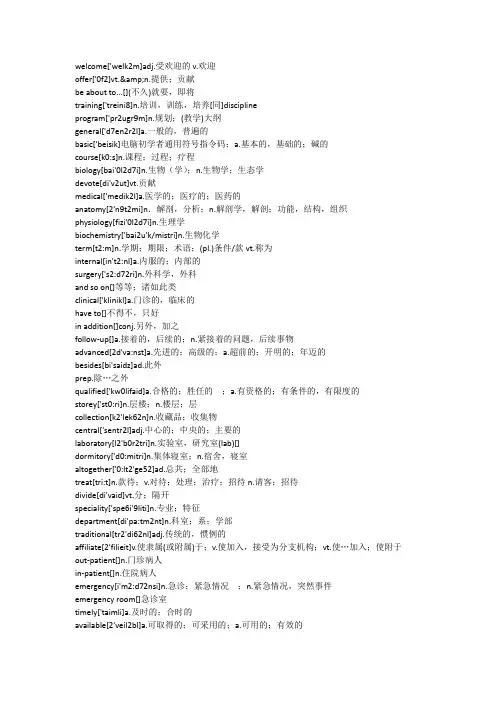
welcome['welk2m]adj.受欢迎的v.欢迎offer['0f2]vt.&n.提供;贡献be about to...[](不久)就要,即将training['treini8]n.培训,训练,培养[同]disciplineprogram['pr2ugr9m]n.规划;(教学)大纲general['d7en2r2l]a.一般的,普遍的basic['beisik]电脑初学者通用符号指令码;a.基本的,基础的;碱的course[k0:s]n.课程;过程;疗程biology[bai'0l2d7i]n.生物(学);n.生物学;生态学devote[di'v2ut]vt.贡献medical['medik2l]a.医学的;医疗的;医药的anatomy[2'n9t2mi]n.解剖,分析;n.解剖学,解剖;功能,结构,组织physiology[fizi'0l2d7i]n.生理学biochemistry['bai2u'k/mistri]n.生物化学term[t2:m]n.学期;期限;术语;(pl.)条件/款vt.称为internal[in't2:nl]a.内服的;内部的surgery['s2:d72ri]n.外科学,外科and so on[]等等;诸如此类clinical['klinikl]a.门诊的,临床的have to[]不得不,只好in addition[]conj.另外,加之follow-up[]a.接着的,后续的;n.紧接着的问题,后续事物advanced[2d'va:nst]a.先进的;高级的;a.超前的;开明的;年迈的besides[bi'saidz]ad.此外prep.除…之外qualified['kw0lifaid]a.合格的;胜任的 ;a.有资格的;有条件的,有限度的storey['st0:ri]n.层楼;n.楼层;层collection[k2'lek62n]n.收藏品;收集物central['sentr2l]adj.中心的;中央的;主要的laboratory[l2'b0r2tri]n.实验室,研究室(lab)[]dormitory['d0:mitri]n.集体寝室;n.宿舍,寝室altogether['0:lt2'ge52]ad.总共;全部地treat[tri:t]n.款待;v.对待;处理;治疗;招待n.请客;招待divide[di'vaid]vt.分;隔开speciality['spe6i'9liti]n.专业;特征department[di'pa:tm2nt]n.科室;系;学部traditional[tr2'di62nl]adj.传统的,惯例的affiliate[2'filieit]v.使隶属(或附属)于;v.使加入,接受为分支机构;vt.使…加入;使附于out-patient[]n.门珍病人in-patient[]n.住院病人emergency[i'm2:d72nsi]n.急诊;紧急情况 ;n.紧急情况,突然事件emergency room[]急诊室timely['taimli]a.及时的;合时的available[2'veil2bl]a.可取得的;可采用的;a.可用的;有效的round the clock[]全天二十四小时;昼夜不停地consult[k2n's3lt]vt.请教;看病;查阅consulting room[]诊室complaint[k2m'pleint]n.抱怨;怨言;控告,发牢骚;疾病ward[w0:d]n.病房 ;n.病房;选区;受监护人vt.避开surgical['s2:d7ikl]a.外科的;外科手术的,外科用的pediatric[pi:di'9trik]a.儿科的intensive care unit[]特别护理组;监护抢救小组(室) separate['sep2reit, 'sep2rit]a.单独的;分离的separate... from...[]把…分开;使…和…分离section['sek62n]n.(组织)部分X-ray[]n.X射线,X光;n.X射线,X光(线);X光照片pharmacy['fa:m2si]n.药房;药学sterilize['sterilaiz]vt.消毒;使…断种instrument['instrum2nt]n.器械;仪器store[st0:]vt.储藏;n.商店,店铺;备用品vt./n.贮藏,贮存in store for[]贮藏以备…bank[b98k]n.库;银行;河岸blood bank[]血库transfusion[tr9ns'fju:7n]n.输血;注入staff[sta:f]n.全体人员;n.(全体)工作人员;(全体)职员medicalstaff[]医务人员make up[]v.组成;决定;配制be made up of...[]由…组成operator['0p2reit2]n.话务员;技术员operate['0p2reit]vi.&vt.运转;开动operate on[]对…施行手术;给…动手术engage[in'geid7]vi.(in)从事于,参加vt.使从事于,使忙于put... throughto...[]接通(电话)…go on[]继续下去;继续进行;发生preparation['prep2'rei62n]n.准备;制备;制剂perform[p2'f0:m]vt.执行;施行;演出appendicitis[2pendi'saitis]n.阑尾炎immediately[i'mi:dj2tli]ad.即刻,立即rib[rib]n.肋骨,肋状物fracture['fr9kt62]vt.使折断n.骨折arrange[2'reind7]v.安排,筹划;整理,使有条理,排列,布置arrange for[]为…作准备(安排)arrangement[2'reind7m2nt]n.安排;布置;筹备right away[]立即,马上,立刻by the way[](用于转入新话题)顺便问一下,顺便说type[taip]n.类型;典型;榜样anesthesia[9nis'4i:zi2]n.麻醉general anesthesia[]全身麻醉assist[2'sist]v.协助,帮助planet['pl9nit]n.行星non-living[]a.无生命的by...we mean[]所谓…指的是…whereas[w/2r'9z]conj.而,却;反之recognize['rek2gnaiz]vt.认识,识别;承认example[ig'za:mpl]n.实例,范例for example[]例如([]for instance)例如,比如;举例说function['f38k62n]n.机能vi.活动(器官)activity[9k'tiviti]n.活动,活跃;行动;n.活动;活性,活力;积极性;能动性;放射性;what is more[]更重要的,更有甚者,而且on one's own[]靠(某人或某物)自己by oneself[]靠..自己;独立surroundings[]n.周围的事物;n.环境,周围事物stimulus['stimjul2s]n.刺激物;鼓励thirdly['42:dli]adv.第三environment[in'vai2r2nm2nt]n.环境,周围状况,自然环境,四周,外界ability[2'biliti]n.能力;能耐,才能;n.专门技能,天资be known as[]以…闻名,通常名叫;叫作;称为;以…闻名irritability[irit2'biliti]n.易怒;n.应激性,兴奋性reproduce['ri:pr2'dju:s]vt.繁殖,再生,复制reproduction['ri:pr2'd3k62n]n.繁殖,再生,复制offspring['0(:)fspri8]n.后代,后裔process['pr2uses]n.过程,程序vt.处理generation['d7en2'rei62n]n.一代(人);发生,产生;生育to sum up[]总之;总结;总而言之,总之growth[gr2u4]n.生长,增加respond[ris'p0nd]vt.回答,答复;vi.回答;响应,反应respond to[]对…有反应;回答response[ris'p0ns]n.作答,回答;响应,反应response to[]对…的反应property['pr0p2ti]n.财产 ;n.财产,资产;财产权,所有权;特性increase[in'kri:s, 'inkri:s]v.增加,增大brain[brein]n.脑子likely['laikli]a.可能的;似乎合适的man-like[]a.象人的minute['minit,mai'nju:t]n.分,分钟;一会儿,片刻a.微小的,详细的electron[i'lektr0n]n.电子virus['vai2r2s]n.病毒;病原体single['si8gl]a.唯一的;单一的thread[4red]n.线;线索v.穿针线等;穿过nylon['nail2n]n.尼龙;尼龙长袜astonishing[2s't0ni6i8]a.非常惊人的computer[k2m'pju:t2]n.电脑,计算机;;电子计算器automatic['0:t2'm9tik]a.自动的;机械的,无意识的;n.小型自动武器thousand['4auz2nd]num.千,千个[pl.]成千上万a.一千的control[k2n'tr2ul]v./n.控制;支配wonderful['w3nd2ful]a.奇妙的;令人惊奇的artificial['a:ti'fi62l]a.人工的,非天然的attempt[2'tempt]vt.尝试,试图n.企图,试图copy['k0pi]vt.抄写;仿效n.副本robot['r2ub0t]n.机器人;自动机happen['h9p2n]vi.发生;偶然,碰巧human['hju:m2n]a.人的,人类的n.人solve['s0lv]vt.解决;解答(难题)reference['ref2r2ns]n.参考;谈到look after[]v.照顾;寻求librarian[lai'br/2ri2n]n.图书馆管理员,馆长;n.图书管理员,图书馆馆长provide[pr2'vaid]v.提供,供给;规定as well as[]conj.又;以及periodical['pi2ri'0dik2l]a.周期的;定期的n.期刊;杂志classify['kl9sifai]v.分类,归类;vt.把…分类,分等级ownership['2un26ip]n.所有权,所有制content['k0ntent, k2n'tent]n.内容;容量;目录engineering['end7i'ni2ri8]n.工程学;n.工程(学),工程师行业frequently['fri:kw2ntli]ad.时常,屡次contain[k2n'tein]vt.包含,容纳;装有nowadays['nau2deiz]adv.当今;现在;ad.现今;在这时代fiction['fik62n]n.小说,虚构,杜撰;n.小说;虚构的故事non-fiction[]n.非小说类文学作品encyclopedia[en'saikl2u'pi:dj2]n.百科全书refer to[]v.查阅;参考;提及deal with[]v.论述;处理;对待subject['s3bd7ikt,s3b'd7ekt]n.主题,题目;n.学科;主语;n.臣民;v.征服;v.以…为条件subject-matter[]n.主题;素材author['0:42]n.作者 ;n.作家;作者title['taitl]n.标题;书目catalog['k9t2l0g]n.目录(本、卡)v.编目录;n.目录,目录册v.将…编入目录alphabetical['9lf2'betik2l]a.按字母顺序的locate[l2u'keit]vt.查出;设置be located in[]坐落在;座落于,位于information['inf2'mei62n]n.通知,报告,消息,情报;n.信息;情报;资料well-informed[]a.见多识广的;a.消息灵通的regular['regjul2]a.定期的;经常的resource[ri's0:s]n.资源;富源amount[2'maunt]n.数量,数额,总数vi.合计,共计a large amount of[]大量creation[kri'ei62n]n.创造;创造物centimetre[]n.公分,厘米width[wid4]n.宽度,宽大organism['0:g2niz2m]n.生物 ;n.生物,有机体;(如生物的)机体、有机组织range[reind7]vi.(在一定幅度或范围内)变动;显示不等 ;n.范围,领域;排列,连续;(山)脉v.排列成行range from...to...[]从…到…particle['pa:tikl]n.颗粒;虚词(语法)bacterium[b9k'ti2ri2m]n.细菌;拳击迷Greek[gri:k]a.希腊的n.希腊人;希腊语invent[in'vent]vt.发明,创造;虚构,捏造Dutch[d3t6]a.荷兰的n.荷兰人merchant['m2:t62nt]a.商业的;商人的;n.商人,零售商homemade['h2um'meid]a.国产的;家庭制的grind[graind]vt.磨;碾lens[lenz]n.透镜,(凹、凸)镜片;n.透镜;镜头magnify['m9gnifai]vt.放大,扩大;夸大,夸张identify[ai'dentifai]vt.辨认;视为同一unit['ju:nit]n.工作单位;n.单位;单元;部件,装置;小队,部队compound['k0mpaund,k2m'paund]n.复合物,复合词a.复合的;n.化合物,复合物a.复合的,化合的eyeglass['aigl9s]n.(通常用复数形式)眼镜go by[]v.过去(时间);依照degree[di'gri:]n.度,度数;程度precision[pri'si72n]n.精确,精确度principle['prins2pl]n.原则,原理;主义,信念optical['0ptik2l]a.光学的;视觉的,视力的on the other hand[]另一方面,反过来说beam[bi:m]n.一道(光线),一束play...a role in...[]在…中起…作用physicist['fizisist]n.物理学家,研究物理学的人structure['str3kt62]n.结构;组织care for[]关心;照顾;喜欢;照顾,照料;喜欢take care of[]照顾,照料;承担,处理,负责personnel['p2:s2'nel]n.全体人员,全体职员;n.人员,职员;a.有关人事的;n.[总称]人员,员工;人事部门contact['k0nt9kt,k2n't9kt]n.联系;社会关系;接头vt.联系,接触have contact with[]与……有联系;和…接触;和…联系in case[]conj.如果;万一thorough['43r2]a.彻底的;详尽的profession[pr2'fe62n]n.职业(尤指脑力劳动或受过专业训练的)the profession[]同行,同业substance['s3bst2ns]n.物质;实体cure[kju2]vt./n.治疗;痊愈;n.治愈;良药,疗法v.治愈,医治;矫正cure...of[]医好某人的病;纠正clinic[klinik]n.门诊所;临床further['f2:52]a.更远的;较远的;a./ad.更进一步的treatment['tri:tm2nt]n.治疗;处理,对待seriously['si2ri2sli]ad.认真地;严肃地;严重地specialize['spe62laiz]vt.专门研究,专门化specialize in...[]专攻…;专于…particular[p2'tikjul2]adj.特殊的;特别的;a.特殊的;特定的branch[bra:nt6]n.分科,学科;分枝for instance[]例如,比如,举例说physician[fi'zi62n]n.(内科)医生 ;n.内科医生;医生solely['s2uli]ad.单独地,只non-surgically[]ad.非外科手术地cardiologist['kadi'0l2d7st]n.心脏病学家specialist['spe62list]n.专家,行家;n.专家;专科医生hematologist[]n.血液学家damage['d9mid7]n.破坏,损害;n.毁坏vt.损害;损坏dentist['dentist]n.牙科医生;n.牙医specially['spe62li]ad.特别地,专门地;ad.特别地,特地;特别,格外地ounce[auns]n.盎斯(英制重量单位);一点点;少量;n.盎司,英两;少量means[mi:nz]n.方法,手段,工具;金钱,财产prevention[pri'ven62n]n.预防,防止,阻止,妨碍smallpox['sm0:lp0ks]n.[医]天花case[keis]n.病例;患者;情况die[dai]v.死亡,去世die of...[]死于…die from[]死于…recover[ri'k3v2]vt.恢复,复元recover from...[]vi.恢复健康,痊愈scar[ska:]vt.使留下伤疤n.伤疤rare[r/2]a.稀有的;难得的 ;a.稀薄的;稀有的,稀疏的,珍奇的ad.很,非常,煎得嫩的notice['n2utis]n.通知v.注意到immune[i'mjun]a.有免疫力的;不受影响的;a.免疫的;免除的;不受影响的immune to...[]对…有免疫力immunity[i'mjuniti]n.免疫性;n.免疫;免除observation['0bz2:'vei62n]n.注意;观察;n.观察;观测inoculation[in0kju'lei62n]n.接种;预防注射deliberately[di'lib2ritli]ad.有意地;审慎地diseased[]a.生病的;有病的mild[maild]a.轻微的;和缓的severe[si'vi2]a.严厉的;严格的 ;a.严重的;严厉的,剧烈的acquire[2'kwai2]vt.取得;获得;学到,习得;养成(习惯)resist[ri'zist]vt.抵抗;抗,耐set to work[]开始工作cowpox['kaup0ks]n.牛痘germ[d72:m]n.病菌;胚芽transfer[tr9ns'f2:]vt.转移;转变;转让vaccination[v9ksi'nei62n]n.种痘;接种疫苗practically['pr9ktik2li]ad.实际上;几乎;实用地,实际地wipe out[]v.消灭;根除obvious['0bvi2s]a.清楚的;明白的obviously['0bvi2sli]ad.显然地;ad.明显地,显而易见地intricate['intrikit]a.复杂的,难了解的spaceship['speis6ip]n.宇宙飞船,太空船microscopic['maikr2'sk0pik]a.极微小的,微观的macroscopic['m9krou'sk0pik]a.肉眼可见的,宏观的block[bl0k]n.砌块;部件;街区structural['str3kt62r2l]a.结构的,构造的unaided[3n'eidid]a.无助的;独立的;a.没有帮助的unaided eye[](不借助设备的)肉眼similar to...[]与…相似fashion['f962n]n.样子;方式;时髦tissue['tisju:]n.薄纸,棉纸;n.组织;薄纸,纸巾namely['neimli]ad.即;也就是epithelial[epi'4i:li2l]a.上皮的cover['k3v2]vt.覆盖;包括n.盖子outer['aut2]a.外面的;外层的surface['s2:fis]n.表面a.表面的,肤浅的line[lain]n.直线;排列;生产线;n航线;n.绳子;v.排队;n.(剧)台词organ['0:g2n]n.器官,机关muscular['m3skjul2]a.肌肉的;强有力的;a.肌肉发达的,强健的connective[k2'nektiv]a.连接的;结合的;连接词;连接的connective tissue[]结缔组织naked['neikid]a.无遮盖的;裸体的naked eye[]肉眼in turn[]反过来,转过来,依次complex['k0mpleks]a.复杂的,复合的stomach['st3m2k]n.胃;腹部circulatory['s2:kjul2t2ri]a.循环的(血液)respiratory[ris'pai2r2t2ri]a.呼吸的digestive[di'd7estiv]a.消化的;有消化力的vessel['vesl]n.管,脉管;n.容器;船,飞船;管blood vessel[]血管tube[tju:b]n.管子,筒air tube[]气管spinal['spainl]a.脊椎骨的cord[k0:d]n.髓;索;带spinal cord[]脊髓coordinate[k2u'0dinit]vt.使协调;使同等nervous['n2:v2s]a.神经的;神经紧张的nervous tissue[]神经组织circulation['s2:kju'lei62n]n.血液循环;n.循环;流通,传播;(报纸,书刊的)销售量circular['s2:kjul2]a.圆形的,环形的;循环的;a.圆形的;循环的;间接的n.传单,通报circulate['s2:kjuleit]vt.循环(血液);流通define[di'fain]vt.解释;给…下定义be defined as...[]下定义为…accomplish[2'k0mpli6]vt.实行;完成;vt.完成(任务等);v.完成,实现,达到vascular['v9skjul2]a.血管的,脉管的compose[k2m'p2uz]v.组成,构成;创作;排字;使安静be composed of...[]由…组成component[k2m'p2un2nt]n.成分;部分a series of...[]一系列的…collectively[]ad.总体地;集体地;ad.集体地,共同vessel['vesl]n.管,脉管;n.容器;船,飞船;管artery['a:t2ri]n.动脉;干线,要道capillary[k2'pil2ri]n.毛细血管a.毛细管道;毛状的vein[vein]n.静脉,血管;叶脉;纹理;方式,风格;n.静脉;矿脉;情绪connect[k2'nekt]v.连接;相连;联系;vt.连接;与…联系,接通(电话)vi.连接connect... with...[]把…与…连接bringabout[]v.引起;发生;带来hollow['h0l2u]n.腔;穴;凹a.空的all the time[]每时每刻briefly[]ad.简短地;简单地oxygen['0ksid72n]n.氧;氧气oxygen-laden[]n.带氧的;携氧的deoxygenate[di:'0ks2d72neit]vt.除去氧气aorta[ei'0:t2]n.主动脉give off[]v.放出,排出absorb[2b's0:b]vt.吸收;接受;vt.吸引…的注意;vt.吸收(水、光、蒸汽等);vt.并入,同化intestine[in'testin]a.内部的;国内的n.肠liver['liv2]n.肝脏carbon['ka:b2n]n.碳元素dioxide[dai'0ksaid]n.二氧化硫;n.二氧化物carbon dioxide[]二氧化碳by wayof...[]经由…;通过…方法pulmonary['p3lm2n2ri]a.肺的;肺状的discharge[dis't6a:d7]vt.排出(气体);解除cycle['saikl]n.自行车;周期,循环v.骑自行车;循环major['meid72]a.较大的;主要的n.主修课;少校vi.主修systemic[sis'temik]a.全身的;系统的transport[tr9ns'p0:t]vt.输送;运输lesser['les2]a.较小的;更少的;次要的minor['main2]a.较小的,较少的;较次要的hepatic[hi'p9tik]a.肝的n.保肝药cerebral['ser2br2l]adj.脑的;睿智的;a.脑的,大脑的;深思的,用脑的pollute[p2'lju:t]v.污染;弄脏polluter[]n.污染者;污染物质;n.造成污染者;污染源community[k2'mju:niti]n.社团;社会;团体bothersome['b052s2m]a.令人厌恶的;麻烦的in...way[]以…方式partly['pa:tli]ad.部分地;不完全地exhaust[ig'z0:st]n.排气,排出vt.用尽pipe[paip]n.管子,导管;烟斗vt.用管道输送exhaust pipe[]排气管trash[tr96]n.废物,垃圾;断枝invisible[in'viz2bl]a.看不见的,无形的detect[di'tekt]vt.检测;探测current['k3r2nt]n.气流;电流;趋势trap[tr9p]vt.止住blanket['bl98kit]n.毛毯;毡a blanket of...[]一片或一页的smog[sm0g]n.烟雾irritate['iriteit]vt.刺激,使兴奋keep...from...[]v.阻止;避开like[laik]vt.喜欢;喜爱prep.像;跟…一样;v.希望,想要emphysema[emfi'si:m2]n.肺气肿bronchitis[br08'kaitis]n.支气管炎affect[2'fekt]v.影响;感动;(在感情方面)打动,震动;(疾病)侵袭,使染患uncomfortable[3n'k3mf2t2bl]a.不舒服的;不自在的lack[l9k]n.&vt.缺乏,不足soil[s0il]vt.弄脏n.污点;土壤rust[r3st]vt.生锈,使…生锈discolor[dis'k3l2]vt.使…变色(或褪色)tremendous[tri'mend2s]a.非常的,惊人的;a.巨大的,极大的;非常的,极好的sum[s3m]n.总数;总和a sum of money[]一笔钱research[ri's2:t6]n.调查;研究;科研conduct['k0nd2kt,k2n'd3kt]vt.实施;进行;传导effective[i'fektiv]a.有效的;有力的combat['k0mb9t]vt.与…斗争;反对obviously['0bvi2sli]ad.显然地;ad.明显地,显而易见地diagnosis['dai2g'n2usis]n.诊断;诊断书determine[di't2:min]v.决定;决心;测定,确定nature['neit62]n.性质;种类;自然symptom['simpt2m]n.症状 ;n.症状,征候,征兆sign[sain]n.符号,记号;vi.做暗号,作手势;n.告示,迹象;v.签名;n.海报,布告objective[0b'd7ektiv]a.客观的;真实的n.目标,目的observe[2b'z2:v]vt.观察;遵守;评说vi.注意;说,评论characteristic['k9rikt2'ristik]a.表明特性的;特有的characteristic of...[]表明…特性的accompany[2'k3mp2ni]vt.陪伴,陪同;伴随,一起发生;伴奏syndrome['sindroum]n.综合病症,综合症状;n.综合症状;一系列表现(事件等) frequently['fri:kw2ntli]ad.频繁地;屡次地evaluate[i'v9ljueit]vt.评价,估计;vt.评价,评估,估价,求...的值extremely[iks'tri:mli]ad.极其,非常disorder[dis'0:d2]n.失调;轻病;混乱prescribe[pris'kraib]vt.开(药方);规定therapy['4er2pi]n.疗法 ;n.治疗;疗法chemotherapy[kemou'4er2pi]n.化学疗法(化疗)physiotherapy[fizi2'4er2pi]n.物理疗法(理疗)measure['me72]n.措施;办法;量度carry out[]v.进行;执行;实施recent['ri:snt]a.最近的,近日的;a.新近的;近来的recently[]ad.近来relate[ri'leit]vi.有关;涉及;v.叙述,讲述;使互相关联professional[pr2'fe62nl]a.职业的;业务的take on[]呈现,具有,装出;接纳,接受;承担,从事responsibility[ris'p0ns2'biliti]n.责任;负责aim[eim]n.目的;目标;瞄准vt.把…瞄准vi.瞄准,针对aim at[]瞄准,针对;目的在于…exist[ig'zist]vi.存在;生存,生活existing[]a.现存的,目前的;a.现有的concept['k0nsept]n.概念,理论;想法;n.概念,观念,思想seek[si:k]vt.试图;寻找;请求actually['9ktju2li]ad.实际上;实际地;adv.实际上,事实上promotion[pr2'm2u62n]n.促进;增长;晋级vast[va:st]adj.巨大的;广阔的;大量的;非常的;巨额的organization['0:g2nai'zei62n]n.组织;机构;团体international['int2(:)'n962nl]adj.国际的;世界的individual['indi'vidju2l]a.个别的,单独的;独特的n.个人,个体maintenance['meintin2ns]n.维持,保持;维修;坚持,维护;n.维修,保养;维持,保持mental['mentl]adj.精神的;脑力的;a.智力的;精神的;神经不正常的,精神病的antibiotic[9ntibai'0tik]n.抗生素a.抗生的resistant[ri'zist2nt]a.有抵抗能力的;a.抵抗的,反抗的resistant to...[]对…有抵抗力antibiotic-resistant[]a.耐抗生素的arrest[2'rest]vt.阻止;抑止;逮捕pathogenic[p942'd7enik]a.[医]病原的,致病的,发病的upset[3p'set]vt.扰乱n.紊乱vital['vaitl]a.充满生机的 ;a.生命的;有活力的;致命的;至关重要的;adj.极重要的derive[di'raiv]vt.取得,得到be derived from...[]由…而来;起源于mold[m2uld]n.模子,气质v.塑造n.([]mould)模子;模型vt.用模子做,浇铸;n.霉(菌);性格penicillin[peni'silin]n.盘尼西林,青霉素Penicillium[peni'sili2m]n.特异青霉,点青霉;[拉]青霉属Be made from...[]由…制成Streptomyces['strept2'maisi:z]n.链霉菌属streptomycin[strept2'maisin]n.链霉素incalculable[in'k9lkjul2bl]a.不可数的;无数的benefit['benifit]n.利益,好处of benefit to...[]对…有好处mankind[m9n'kaind]n.人类 ;n.[用作单或复]人类give rise to[]v.引起,使发生,招致complication['k0mpli'kei62n]n.并发症;复杂的情况secondary['sek2nd2ri]a.继发的,第二次的specific[spi'sifik]a.特殊的;特定的coexist['kouig'zist]vi.同时存在,共存fungus['f38g2s]n.真菌,真菌类植物;n.真菌,霉菌up to[]直到;该由;胜任administration[2d'minis'trei62n]n.管理,经营;行政机关;政府;n.管理(事务等);经营eliminate[i'limineit]vt.消灭,除去unaffected['3n2'fektid]a.不受影响的;a.自然的,不矫揉造作的prevent... from...[]防止...免于;v.使…不能,阻止unrestrainedly[-idli]ad.无限制地set up[]v.引起;设立,建立allergy['9l2d7i]n.过敏性反应,过敏症;n.过敏症,厌恶abnormal[9b'n0:m2l]a.反常的;异常的 ;a.不正常的;变态的;不规则的reaction[ri'9k62n]n.反应;反作用(力);(against)反动,对抗consequence['k0nsikw2ns]n.结果;后果 ;n.结果,后果,影响;重要性,要紧(和of连) widespread['waidspred]a.分布广的;普及的result in...[]v.产生…的结果,导致evolution['i:v2'lju:62n]n.发展;发育,进化strain['strein]n.株(细菌等);品系medication[medi'kei62n]n.药疗法;药剂prevalence['prev2l2ns]n.流行;普遍fast[fa:st]a.抗拒的drug-fast[]抗药的,耐药的staphylococci[]n.葡萄状球菌;葡萄球菌quinine[kwi'nin]n.奎宁free from...[]a.无…的,免去…的value['v9lju:]n.价值;重要的Spaniard['sp9nj2d]n.西班牙人count[kaunt]n.伯爵(贵族的头衔)Lima['li:m2]n.利马(秘鲁首都)Peru[p2'ru:]n.秘鲁(拉丁美洲一国家名)Peruvian[p2'ru:vi2n]a.秘鲁的 ;a.秘鲁的;秘鲁人的America[2'merik2]n.美洲;美国Amerindian['9m2r'indj2n]n.美洲印第安人Indian['indi2n]a.印度的,印度人的;印地安人的n.印度人;印第安人mosquito[m2s'ki:t2u]n.蚊子breed[bri:d]n.种;属 ;n.种,品种vi.繁殖vt.饲养;养育;酿成drain[drein]v.排去;排水;引流drain away[]排去…的水bark[ba:k]n.树皮;n.吠叫声vi.吠,叫vt.厉声地说出powder['paud2]n.粉末;粉剂mix[miks]v.混淆;v.混合;混在一起mix with...[]与…混在一起fall ill[]生病;患病intimate['intimit]a.亲密的;密切的worry about...[]为…担心,为…着急secretly['si:kritli]ad.秘密地;隐蔽地secret['si:krit]n.秘密;秘诀;奥妙murder['m2:d2]vt.&n.杀害;谋杀disclose[dis'kl2uz]vt.揭开;泄露utter['3t2]vt.说出;表达absent['9bs2nt,2b'sent]a.缺席的;a.不在的;心不在焉的;茫然的;缺乏的inquire[in'kwai2]vt.打听,询问;调查servant['s2:v2nt]n.仆人;雇工get to[]到达(某地);到达,抓住问题的要害,本质square[skw/2]n.广场;街区in time[]及时;迟早at the last moment[]在最后的时刻wonder['w3nd2]vi.纳闷,想知道;vt.想知道,惊奇vi.惊讶n.惊奇;奇迹reveal[ri'vi:l]vt.揭示,揭露;vt.揭露,泄露;展现,显示;上帝(启示) Europe['ju2r2p]n.欧洲Swedish['swi:di6]a.瑞典的,瑞典人的n.瑞典语;瑞典人name... after...[]v.以…命名countess['kauntis]n.伯爵夫人;女伯爵as to[]prep.至于…;关于…kidney['kidni]n.肾脏;n.肾,腰子;性格transplant[tr9ns'pla:nt]vt.&n.移植(物)fail[feil]vi.(后接不定式)不,不能;v.失败;不及格;不能remedy['remidi]n.治疗法;药物paw-paw[]n.番木瓜grocery['gr2us2ri]n.食品杂货店,杂货exotic[ig'z0utik]a.外来的,异国的strip[strip]n.一片,一条infect[in'fekt]vt.传染,感染;影响…的心情,给…以影响surprise[s2'praiz]n.惊奇;意外之事to one's surprise[]使…感到惊奇remark[ri'ma:k]vt.&n.说;谈论,评论impress[im'pres, 'impres]vt.给予深刻印象in one's opinion[]据某人看来efficacious[efi'kei62s]a.有效的(不指人)otherwise['352waiz]ad.在其他方面detrimental['d/tr2'm/ntl]a.有害的,有损的anyhow['enihau]ad.无论如何,不管怎样;随便地,马马虎虎explanation['ekspl2'nei62n]n.解释,说明;辩解decay[di'kei]vt.&n.腐烂,衷败lay[lei]vi.躺;vt.放置;产卵beetroot['bi:tru:t]n.甜菜根onion['3nj2n]n.洋葱,洋葱头herbal['h2:bl]a.草的;草本的;a.草本植物的herb[h2:b]n.草药;n.草本植物;药草;香草digitalis[did72'teilis]n.洋地黄,毛地黄originate[2'rid7ineit]vi.起源于,来自;v.发生,发起;发明originate from...[]起源于…despite[dis'pait]prep.不管,尽管;prep.不管,不顾,任凭criticism['kritisiz2m]n.批评意见hold[h2uld]vt.认为;相信;握heal[hi:l]v.使(伤、病)痊愈;v.治愈,愈合,痊愈normal['n0:m2li]a.正常的,正规的n.正常状态routine[ru:'ti:n]a.常规的,例行的;n.常规;惯例expensive[iks'pensiv]a.昂贵的,花钱多的import[im'p0:t''imp0:t]vt.输入,进口idea[ai'di2]n.主意,想法;概念,思想;计划,建议medicinal[me'disinl]a.有药性的;医药的;a.药的,药用的,有治疗作用的defence[di'fens]n.保护,保卫,防御by far[]大量;最;非常droplet['dr0plit]n.飞沫;小滴droplet infection[]飞沫感染swarm[sw0:m]vi.密集;涌往;充满inside[in'said]prep.在…内adv.在内部;prep.在…里面n.内部a.内部的ad.在里面positively[]ad.绝对地;肯定地helpful['helpful]a.有用的;a.有帮助的;有益的gain entrance to...[]进入…ensue[in'sju:]vi.随着发生;结果是disease-producing[]a.致病的overcome['2uv2'k3m]vt.战胜,克服;[常用被动语态]压倒fairly['f/2li]ad.相当地,适度地terminate['t2:mineit]vi.(使)结束,(使)停止;v.结束;终止fortunately['f0:t62nitli]ad.幸运地,幸好manage['m9nid7]v.管理,经营,处理;设法对付;控制,操纵penetrate['penitreit]vt.进入;穿透;渗透invader[in'veid2]n.侵略者,侵犯者,入侵者invasion[in'vei72n]n.发病;侵袭;侵略barrier['b9ri2]n.障碍;障碍物;n.栅栏,屏障;障碍(物)guard[ga:d]vt.保护,保卫;防止break[breik]v.打断,打破;v.损坏,违反;n.休息时间;v.穿越;v.(向……)透露;破产beneath[bi'ni:4]prep.在…下面expense[iks'pens]n.花费;费用;n.费用;消耗;代价at the expense of...[]以…作代价,牺牲…host[h2ust]n.宿主;主人a host of...[]许多fluid['flu(:)id]n.液体 ;n.流体,液体a.流体的,流动的release[ri'li:s]vt.放生;释放;v.释放,解放;发表,发行n.释放,豁免,放松responsible[ris'p0ns2bl]a.有责任的;a.负责的;有责任感的normally['n0:m2li]ad.正常地;平常地swallow['sw0l2u]vt.吞;吞没n.吞,咽secrete[si'kri:t]v.分泌;藏匿acid['9sid]n.酸,酸性物质a.酸的,酸味的;尖刻的;讥讽的digest[di'd7est,'daid7est]vt.消化;领会;vt.消化;吸收,领悟n.文摘counteract['kaunt2'r9kt]vt.对…起反作用,对抗,抵消;vt.抵抗;抵消leucocyte['lu:k2sait]n.白细胞;n.白血病site[sait]n.部位,位置;场所eat up[]吃光;吃完;消耗;用完engulf[in'g3lf]v.吞没phagocytosis[f9g2sai'tousis]n.噬菌作用;吞噬作用phagocyte['f9g2sait]n.[吞]噬细胞antibody['9ntib0di]n.抗体(身体中的抗病物质)manufacture['m9nju'f9kt62]n./vt.制造;生产;v.制造,加工n.制造,制造业;产品bloodstream[常the ~, one's~]n.血液;n.血流protection[pr2'tek62n]n.保护 ;n.保护,防护物cross[kr0s]vt.横过n.十字(形)cross infection[]交叉感染admit[2d'mit]vt.允许进入;v.承认,供认;准许…进入,准许…加入occur[2'k2:]vi.发生;存在occur to sb.[]想起,想到fatal['feitl]a.致命的;命中注定的be aware of...[]意识到;明白;觉察到take place[]发生;进行;举行secretion[si'kri62n]n.分泌物;隐藏faeces[]n.粪;排泄物,渣滓urine['ju2rin]n.小便,尿indirectly[]ad.间接地 ;a.间接地;不直接了当地lesion['li:72n]n.创伤(身体上的);n.身体上的伤害access['9kses]n.接近;通道,入口;n.接近的机会;享用(权);n.访问vt.存取;vt.取得gain access to...[]进入…inhalation[inh2'lei62n]n.[医]吸入;吸入药剂ingestion[in'd7est62n]n.咽下;吸收significant[sig'nifik2nt]a.有意义的,意味深长的;重要的,重大的significance[sig'nifik2ns]n.重要性;重大;n.意义,意味;重要性strict[strikt]a.严格的;精确的preventive[pri'ventiv]a.预防的n.预防法attend[2'tend]v.出席,参加;照顾,护理,照料attend to...[]护理,照顾;专心considerable[k2n'sid2r2bl]a.重要的,值得重视的consequently['k0nsikw2ntli]ad.因而,所以equipment[i'kwipm2nt]n.装备;设备;n.设备,器材,装置article['a:tikl]n.物品,东西;n.文章,论文;物件,物品;条款;冠词linen['linin]n.亚麻织物(指台布等)bedsheet[]n.床单disinfect[disin'fekt]vt.给…消毒;清除;vt.消毒;净化thoroughly['43r2li]ad.彻底地,全面地free of[]无…的;免除的;没有route[ru:t]n.路线;航线;n.途径;道路transmission[tr9nz'mi62n]n.传染;传送;发射essential[i'sen62l]a.必不可少的;实质的above-mentioned[]a.以上提到的,上述的undertake['3nd2'teik]vt.进行,从事;承担be sure to[]必定,一定reduce[ri'dju:s]vt.减少,缩减;复位pharmacologist[f1:m2'k0l2d7ist]n.药理学家,药物学家pharmacology[f1:m2'k0l2d7i]n.药理学,药物学noted['n2utid]a.著名的,有声望的province['pr0vins]n.省;领域,范围childhood['t6aildhud]n.幼年;童年期keen[ki:n]a.强烈的;锐利的go into...[]从事…;加入…concern[k2n's2:n]vt.涉及;对…有关render['rend2]vt.提供;翻译;使得commence[k2'mens]n.开始,着手;vt.开始vi.获得学位carry on...[]继续;经营tradition[tr2'di62n]n.传统,习俗delay[di'lei]n.&vt.耽误;延迟recipe['resipi]n.处方;秘诀integrate['intigreit]vt.使成为整体integrate...with...[]使…与…结合in particular[]特别地;尤其;特别,尤其;详细地grave[greiv]a.严肃的n.墓(穴);a.严重的;严肃的,庄重的n.坟墓error['er2]n.差错 ;n.错误,谬误;差错decade['dekeid]n.十年,十年期work at...[]忙于…,从事于…eventually[i'ventju2li]ad.最后;终于Ben Cao Gang Mu[]n.《本草纲目》pharmacopoeia[f1:m2k2'pi:2]n.药典present['preznt]a.出席的n.现在;礼物;vt.赠予;a.提供;上演;介绍explicit[iks'plisit]a.明确的;直爽的;a.详述的,明确的;坦率的;显然的direction[di'rek62n]n.方向,方位;指导,指挥;用法说明preparation['prep2'rei62n]n.准备;配制;制剂prescription[pris'krip62n]n.处方;吩咐;指示illustration['il2s'trei62n]n.说明;例证,插图;举例说明description[dis'krip62n]n.描述;图说describe[dis'kraib]vt.描绘;叙述described as[]说成是moreover[m0:'r2uv2]ad.而且,此外,再者seemingly[]ad.表面上;外观上 ;ad.表面上;看来distillation['distl'e62n]n.蒸馏(过程);净化(过程);精华;摘要mercury['m2:kjuri]n.水银,汞;水星ephedrine[e'fedrin]n.麻黄碱;麻黄素masterpiece['ma:st2pi:s]n.杰作;名著universally['ju:ni'v2:s2li]ad.全体地,普遍地,无例外地;ad.普遍地,一般地world-wide[]a.遍及全球的fame[feim]n.名声;声誉universe['ju:niv2:s]n.宇宙,万物,世界;领域,范围atmosphere['9tm2sfi2]n.大气;空气;气氛pure[pju2]a.纯净的,单纯的salt[s0:lt]n.盐;盐类;vt.加盐于chalk[t60:k]vt.用粉笔写或画n.白垩;粉笔protein['pr2uti:n]n.蛋白质,朊concerned with...[]有关…aspect['9spekt]n.方面;外貌;外观break down[]v.分解;捣毁;瓦解silver['silv2]n.银,银子;n.银,银器,银币v.镀银于nonmetal[n0n'metl]n.非金属物质sulphur['s3lf2]n.硫磺;n.硫(磺),硫黄monoxide[m0'n0ksaid]n.一氧化物fume[fju:m]n.汽,烟exhaust fume[]废气yield[ji:ld]vt.产生;出产yield to...[]屈服于;投降exhale['eksheil, eg'zeil]vt.呼出;发出neutron['nju:tr0n]n.[物]中子composition['k0mp2'zi62n]n.成分;构成;作文transformation['tr9nsf2'mei62n]n.转变;变质;变形hardness['ha:dnis]n.坚硬,硬度;n.硬度;艰难,难度heaviness['hevinis]n.重;重量dissolve[di'z0lv]vt.溶解;消散naturally['n9t62r2li]ad.自然地;必然地consistent[k2n'sist2nt]a.一致的;经常的fall into...[]v.分成…;陷入…division[di'vi72n]n.部分;分开;划分subdivision[s3bdi'vi72n]n.细分;再分的部分organic[0:'g9nik]a.有机的;器质性的inorganic['in0:'g9nik]a.无生物的;无机的analytical[9n2'litikl]a.分析的;用分析方法的;a.分析的;用分析法的radiochemistry['reidiou'kemistri]n.放射化学associate[2's2u6ieit]vt.使发生联系associated with...[]a.与…有关;由于fundamental['f3nd2'mentl]a.基本的,基础的atomic[2't0mik]a.原子的;原子能的radioactive['reidi2u'9ktiv]a.放射性的,辐射性的involve[in'v0lv]vt.包括;牵涉foodstuff[]n.食料,粮食;n.食品,食料utilization['ju:tilai'zei62n]n.利用,使用;n.利用,效用biological['bai2'l0d7ik2l]a.生物学的;a.生物学(上)的nutrition[nju:'tri62n]n.营养;营养学nutrient['njutri2nt]n.营养物 ;a.营养的,滋养的n.营养物,营养品nourishment['n3ri6m2nt]n.滋补品,营养品;n.食物;营养品(情况) whatever[w0t'ev2]pron.不论什么;pron.无论什么a.无论什么样的enable[i'neibl]vt.使能够,使可能,使可行replace[ri'pleis]vt.取代;代替;放回replace by[]用…来代替nail[neil]n.指甲;铁钉category['k9tig2ri]n.种类;范畴carbohydrate['ka:b2u'haidreit]n.碳水化合物;[pl.]淀粉质食物vitamin['vit2min]n.维生素,维他命mineral['min2r2l]n.矿物,无机物figure['fig2]n.数字;插图vt.想象figure out[]解决,算出;理解,弄清楚;(美口)想出;理解,明白figure into[]列入;包括进diet['dai2t]n.日常饮食;规定饮食 ;n.饮食,食物,规定的食物v.节食quantity['kw0ntiti]n.量,数量compare[k2m'p/2]vt.比较;对照;v.比较,相比;比作compare with...[]与…比较compare to...[]比作…builder['bild2]n.建造者;施工者;n.建筑工人,建设者hemoglobin[hi:m2gloubin]n.血红蛋白carrier['k9ri2]n.载体;媒介物calcium['k9lsi2m]n.钙(化学符号Ca)phosphorus['f0sf2r2s]n.磷indispensable['indis'pens2bl]a.不可缺少的indispensable to...[]为…所不可缺少的thyroid['4air0id]n.甲状腺a.盾状的gland[gl9nd]n.[解]腺emphasize['emf2saiz]v.强调,着重,增强detail['di:teil]n.细节;详情;n.细节,详细in detail[]详细地regulation['regju'lei62n]n.调节;管理;规则metabolism[m2't9bliz2m]n.新陈代谢,代谢作用distinguish[dis'ti8gwi6]vt.区别,辨别vi.区别,辨别;v.区别;识别distinguish from...[]把…区别于…soluble['s0ljubl]a.可溶解的;可解决的;a.可溶的;可以解决的whereas[w/2r'9z]conj.而在另一方面respectively[ri'spektivli]ad.个别地;分别地complex['k0mpleks]n.复合体B-complex[]复合维生素Babsence['9bs2ns]n.缺席,不在;n.缺席;缺乏,缺少deficiency[di'fi62nsi]n.缺乏;缺席;离开blindness['blaindnis]n.瞎;失明;n.失明;愚味,文盲night blindness[]夜盲rickets['rikits]n.佝偻病,软骨病scurvy['sk2:vi]n.坏血病;a.卑鄙的,可鄙的characterize['k9rikt2raiz]vt.以…为特征hemorrhage['hem2rid7]n.出血,溢血fragility[fr2'd7iliti]n.脆弱;n.易碎,脆性loosen['lu:sn]vt.使放松,松驰none[n3n]pron.毫无varied['v/2rid]a.不同的;各种各样的well-balanced[]a.均衡的motto['m0t2u]n.箴言;格言;n.座右铭;格言;题词exercise['eks2saiz]n.练习;vi.运动,锻炼n.运动depend[di'pend]vi.依...而定;vi.依靠;依赖;信赖depend on[]依…而定;依靠…。
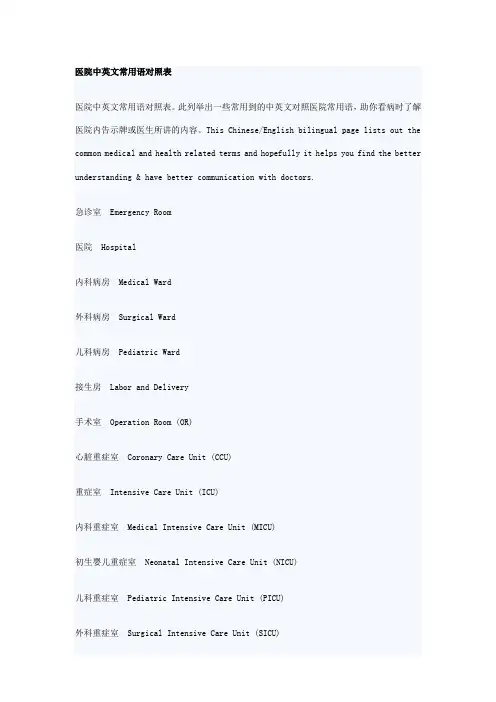
医院中英文常用语对照表医院中英文常用语对照表。
此列举出一些常用到的中英文对照医院常用语,助你看病时了解医院内告示牌或医生所讲的内容。
This Chinese/English bilingual page lists out the common medical and health related terms and hopefully it helps you find the better understanding & have better communication with doctors.急诊室Emergency Room医院Hospital内科病房Medical Ward外科病房Surgical Ward儿科病房Pediatric Ward接生房Labor and Delivery手术室Operation Room (OR)心脏重症室Coronary Care Unit (CCU)重症室Intensive Care Unit (ICU)内科重症室Medical Intensive Care Unit (MICU)初生婴儿重症室Neonatal Intensive Care Unit (NICU)儿科重症室Pediatric Intensive Care Unit (PICU)外科重症室Surgical Intensive Care Unit (SICU)末期护理Hospice 末期病患者照料居家健康服务Home Health Service 药疗、物理治疗等化验所Laboratory 进行化验研究门诊手术中心Outpatient Surgical Center 一般非严重性手术药房Pharmacy 药物、医疗用品Health Care Provider 医疗服务Physician 医生Acupuncture 针灸Allergy and Immunology 过敏性专科Anesthesiology 麻醉科Cardiology 心脏科Cardio-Thoracic Surgery 心胸外科Chiropractic 脊椎神经科Colorectal Surgery 结肠直肠外科Dentistry 牙科Dermatology 皮肤科Endocrinology 内分泌科Family Practice 家庭科Gastroenterology 肠胃科General Practice 普通全科General Surgery 普通外科Geriatrics 老人病专科Hematology 血液科Hepatology 肝病专科Infectious Disease 传染病科Internal Medicine 内科Nephrology 肾脏科Neurology 神经科Neurosurgery 神经外科Obstetrics-Gynecology 妇产科Oncology 癌症专科Ophthalmology 眼科Optometry 验光科Orthopedic Surgery 骨外科Osteopathy 整骨疗科Otolaryngology (ENT) 耳鼻喉科Pathology 病理科Pediatrics 小儿科Plastic surgery 整形外科Podiatry 足科Psychiatry 精神治疗科Physiatry 物理康复科Physical Medicine and Rehabilitation 物理疗法及恢复正常生活护理Pulmonary Medicine 肺科Radiation Oncology 癌症放射疗科Radiology X光科Urology 泌尿科Vascular Surgery 血管外科Other Health Care Professionals 其它医疗专业人员Audiologist 听觉学专家Dental Assistant 牙医助理Dietitian 饮食指导员Genetic Counselor 遗传病辅导员Health Technician 健康技员Laboratory Technician 化验技员Medical Assistant 医务助理Medical Technologist 医学技师Nurse 护士Home Visiting Nurse 家访护士Nurse Midwife 接生护士Nutritionist 营养专家Pharmacist 药剂师Pharmacologist 药理学专家Physical Therapist 物理治疗员Physician's Assistant 医生助手Psychologist 心理学专家Psychologic Counselor 心理辅导员Respiratory Therapist 呼吸治疗员X-Ray Technician X光科技员有关看病的英文表达方法有关看病的英文表达方法。
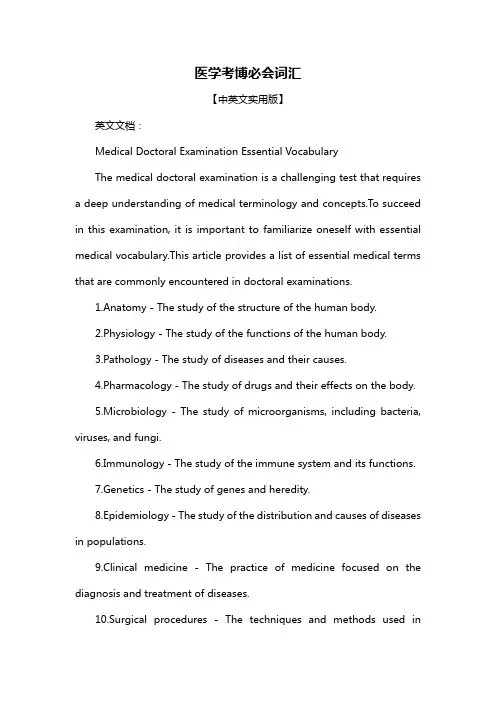
医学考博必会词汇【中英文实用版】英文文档:Medical Doctoral Examination Essential VocabularyThe medical doctoral examination is a challenging test that requires a deep understanding of medical terminology and concepts.To succeed in this examination, it is important to familiarize oneself with essential medical vocabulary.This article provides a list of essential medical terms that are commonly encountered in doctoral examinations.1.Anatomy - The study of the structure of the human body.2.Physiology - The study of the functions of the human body.3.Pathology - The study of diseases and their causes.4.Pharmacology - The study of drugs and their effects on the body.5.Microbiology - The study of microorganisms, including bacteria, viruses, and fungi.6.Immunology - The study of the immune system and its functions.7.Genetics - The study of genes and heredity.8.Epidemiology - The study of the distribution and causes of diseases in populations.9.Clinical medicine - The practice of medicine focused on the diagnosis and treatment of diseases.10.Surgical procedures - The techniques and methods used insurgical operations.11.Diagnostic imaging - The use of imaging techniques, such as X-rays and MRIs, to visualize the inside of the body.12.Therapeutics - The study of the treatment and prevention of diseases.13.Pharmacokinetics - The study of how the body absorbs, distributes, and excretes drugs.14.Biochemistry - The study of the chemical processes that occur within living organisms.15.Molecular biology - The study of the structure and function of biological molecules.These terms are just a starting point, and there are many other medical terms that are important for the medical doctoral examination.It is important to study and understand these terms in the context of their respective fields to have a comprehensive understanding of medical concepts.中文文档:医学考博必备词汇医学考博考试是一项具有挑战性的测试,要求深入理解医学术语和概念。
Unit10 topic talkinglesson2单词讲义clinic词性:名词中文意思:诊所,门诊部英文释义:a place where a doctor or group of doctors give medical treatment to patients who need it词源:来自希腊语“klinē”,意为“折叠”或“弯曲”,因为古代的医生在治疗时常常弯下身子。
例句:I have an appointment at the clinic tomorrow.固定搭配:dental clinic(牙科诊所),walkin clinic(门诊部)近义词:clinic, hospital, medical centergallery词性:名词中文意思:画廊,展览馆英文释义:a room or building in which works of art are exhibited for public viewing词源:来自拉丁语“galeria”,意为“走廊”或“走道”。
例句:We visited the art gallery last weekend.固定搭配:art gallery(艺术画廊),photography gallery(摄影展览馆)近义词:exhibition hall, museum, showroomgrocery词性:名词中文意思:杂货店,食品店英文释义:a shop that sells food and household goods词源:来自古法语“grossecour”,意为“大市场”。
例句:I need to go to the grocery store to buy some milk.固定搭配:grocery store(杂货店),grocery list(购物清单)近义词:food store, market, supermarketstadium词性:名词中文意思:体育场,运动场英文释义:a large structure with a field or court for sports events or games词源:来自拉丁语“stadium”,意为“座位”或“看台”。
医疗健康英语词汇大全增加你对医疗健康的英语词汇量和专业知识Medical and Health English Vocabulary Comprehensive Guide: Enhancing Your Vocabulary and Knowledge in Medical and Health FieldsIntroduction:In the modern era, medical and health-related knowledge plays a crucial role in our daily lives. Whether it is understanding medical advice, discussing health concerns with professionals, or simply reading health-related articles, having a strong grasp of medical and health English vocabulary is essential. This comprehensive guide aims to expand your vocabulary and enhance your knowledge in the medical and health fields.I. Body Systems and Medical Terminology:1. Respiratory System:- Bronchitis: Inflammation of the bronchial tubes.- Pneumonia: Infection that inflames air sacs in one or both lungs.- Asthma: Chronic condition causing airway inflammation and narrowed airways.2. Cardiovascular System:- Hypertension: High blood pressure that can lead to heart problems.- Atherosclerosis: Build-up of plaque in the arteries.- Myocardial Infarction: Heart attack caused by a blocked blood supply to the heart.3. Digestive System:- Gastritis: Inflammation of the stomach lining.- Hepatitis: Inflammation of the liver, usually caused by a virus.- Gastroesophageal Reflux Disease (GERD): Chronic acid reflux that can lead to complications.4. Nervous System:- Alzheimer's Disease: Progressive brain disorder affecting memory and cognitive functions.- Epilepsy: Neurological disorder characterized by recurring seizures.- Parkinson's Disease: Degenerative disorder of the nervous system affecting movement.II. Common Symptoms and Conditions:1. Symptoms:- Fever: An elevated body temperature, often a sign of an underlying infection.- Fatigue: Feeling of tiredness or lack of energy.- Headache: Pain or discomfort in the head.2. Conditions:- Diabetes: Chronic condition resulting in high blood sugar levels.- Arthritis: Inflammation of one or more joints, causing pain and stiffness.- Depression: Mental health disorder characterized by persistent sadness.III. Medical Professionals and Specialized Fields:1. Medical Professionals:- General Practitioner (GP): Primary care physician providing general medical care.- Cardiologist: Specialist in treating diseases and conditions of the heart.- Dentist: Healthcare professional specializing in oral health and dental care.2. Specialized Fields:- Radiology: Medical imaging and diagnosis using techniques such as X-rays and MRI.- Oncology: Branch of medicine focusing on the prevention, diagnosis, and treatment of cancer.- Pediatrics: Branch of medicine concerned with the health and development of children.IV. Healthcare Facilities and Services:1. Healthcare Facilities:- Hospital: Institution providing medical, surgical, and emergency services.- Clinic: Healthcare facility where patients receive specialized medical treatment or consultations.- Pharmacy: Facility where prescription medications and over-the-counter drugs are dispensed.2. Services:- Vaccination: Administration of vaccines to prevent specific diseases.- Physical Therapy: Rehabilitation and treatment for physical injuries or conditions.- Counselling: Professional guidance and support for mental health concerns.V. Medical Procedures and Treatments:1. Procedures:- Biopsy: Removal of tissue or cells for examination and diagnosis.- Colonoscopy: Examination of the colon and rectum using a flexible tube with a camera.- Electrocardiogram (ECG): Test recording the electrical activity of the heart.2. Treatments:- Chemotherapy: Treatment using drugs to destroy or slow down the growth of cancer cells.- Radiation Therapy: Treatment using high-energy rays to kill cancer cells.- Antibiotics: Medications used to treat bacterial infections.Conclusion:Expanding your medical and health English vocabulary is vital for effective communication and understanding in these fields. This comprehensive guide has provided a glimpse into various body systems, common symptoms, medical professionals, healthcare facilities, and procedures. By continually learning and incorporating new vocabulary, you can enhance your expertise and confidently navigate the medical and health landscape in English. Remember, a strong vocabulary is the foundation for success in the medical and health fields.。
医学考博必会的基础核心词汇1. alter /'ɔːltəә/v. 改变,改动,变更2. burst /bɝst/vi. n. 突然发生,爆裂3. dispose /dɪ'spəәʊz/vi. 除掉;处置;解决;处理(of)4. abstract/'æbstrækt/ adj.抽象的5.consume/kəәn'sjuːm/ v. 消耗,耗尽6. participate /pɑː'tɪsɪpeɪt/v. (in) 参与,参加7. background/'bækɡraʊnd/ n.背景8. slender/'slendəә/ a. 苗条的,修长的9. slip /slɪp/ v. 滑动,滑落;忽略10. slide /slaɪd/v. 滑动,滑落n. 滑动;滑面;幻灯片11. consent /kəәn'sent/n. /vi.准许,同意(to)12. breed /briːd/n. 种,品种v. 繁殖,产仔13. budget /'bʌdʒɪt/n. 预算v. 编预算,作安排14. candidate/'kændɪdeɪt; -dəәt/ n. 候选人15. campus/'kæmpəәs/ n. 校园16. liberal /'lɪbəәrəәl/a. 慷慨的;丰富的;自由的n.自由主义者17. transform /træns'fɔrm/v. 转变,变革;变换18. transmit /træns'mɪt/v. 传播,播送;传递19. transplant træns'plænt/v. 移植20. transport /'trænspɔrt/vt. 运输,运送n. 运输,运输工具21. shift /ʃɪft/v. 转移;转动;转变22. vary /'veəәrɪ/v. 变化,改变;使多样化23. vanish /'vænɪʃ/vi. 消灭,不见24. swallow /'swɒləәʊ/v. 吞下,咽下n. 燕子25. suspicion /səә'spɪʃəәn/n. 怀疑,疑心26. suspicious /səә'spɪʃəәs/ a. 怀疑的,可疑的27. mild /maɪld/a.温暖的,暖和的;温柔的,味淡的28. tender /'tendəә/a. 温柔的;脆弱的29. nuisance /'njuːs(əә)ns/n. 损害,妨害,讨厌(的人或事物)30. insignificant /,ɪnsɪɡ'nɪfɪkəәnt/a. 无意义的,无足轻重的;无价值的31. accelerate /əәk'seləәreɪt/vt. 加速,促进32. absolute /'æbsəәluːt/a. 绝对的,无条件的;完全的33. boundary /'baʊndri/n. 分界线,边界34. brake /breɪk/n. 刹车,制动器v. 刹住(车)35. catalog /'kætəәlɔ:g/n. 目录(册)v. 编目36. vague /veɪg/a. 模糊的,不明确的37. vain /veɪn/n. 徒劳,白费38. extinct /ɪk'stɪŋkt/a. 绝灭的,熄灭的39. extraordinary /ɪk'strɔːd(əә)n(əә)rɪ/a. 不平常的,特别的,非凡的40. extreme /ɪk'strim/a. 极度的,极端的n. 极端,过分41. agent /'eɪdʒ(əә)nt/n. 代理人,代理商;动因,原因42. alcohol /'ælkəәhɒl/n. 含酒精的饮料,酒精43. appeal /əә'piːl/n. /vi. 呼吁;恳求;吸引;上诉44. appreciate /əә'priʃɪet/vt. 重视,赏识,欣赏;感激45. approve /əә'pruːv/v. 赞成,同意,批准46. stimulate /'stɪmjʊleɪt/vt. 刺激,激励47. acquire /əә'kwaɪəә/vt. 取得,获得;学到48.accomplish /əә'kɑmplɪʃ/vt .完成,到达;实行49. network /'netwɜːk/n. 网状物;广播网,电视网;网络50. tide /taɪd/n. 潮汐;潮流51. tidy /'taɪdɪ/a. 整洁的,整齐的52. trace /treɪs/vt. 追踪,找到n. 痕迹,踪迹53.involve /ɪn'vɒlv/v.使参与,牵扯,涉及,卷入到54. wander /'wɒndəә/vi. 漫游,闲逛(about)55. wax /wæks/n. 蜡56. considerate /kəәn'sɪd(əә)rəәt/adj.考虑周到的,体贴的57. preserve /prɪ'zɜːv/v. 保护,保存,保持,维持58.measure /'meʒəә/n.测量,权衡;n.测量,尺寸59.pressure /'preʃəә/n.压力v.强迫,迫使60.emission /ɪ'mɪʃ(əә)n/n.发射,发送61. abuse /əә'bjuːz/v. 滥用,虐待;谩骂62. academy /əә'kædəәmɪ/n. (高等)专科院校;学会63. academic /ækəә'demɪk/a. 学术的;高等院校的;研究院的64. attraction /əә'trækʃ(əә)n/n. 吸引,吸引力65. barrier /'bærɪəә/n. 障碍;棚栏66. psychologist /saɪ'kɒləәdʒɪst/n.心理学家67. career /kəә'rɪəә/n. 生涯,职业68. evaluate /ɪ'væljʊeɪt/vt. 评估,评价69. vertical /'vɜːtɪk(əә)l/a. 垂直的70. oblige /əә'blaɪdʒ/v. 迫使,责成;使感激71. obscure /əәb'skjʊəә/a. 阴暗,模糊72. extent /ɪk'stent; ek-/n. 程度,范围,大小,限度73. exterior /ɪk'stɪəәrɪəә; ek-/n. 外部,外表a. 外部的,外表的74. external /ɪk'stɜːn(əә)l; ek-/a. 外部的,外表的,外面的75. petrol /'petr(əә)l/n. 汽油76. petroleum /pɪ'trəәʊlɪəәm/n. 石油77. delay /dɪ'leɪ/vt./n. 推迟,延误,耽搁78. decay /dɪ'keɪ/vi. 腐烂,腐朽79. decent /'diːs(əә)nt/a. 像样的,体面的80. route /ruːt/n. 路;路线;航线81. ruin /'ruːɪn/v./n. 毁坏,破坏[pl.]废墟82. sake /seɪk/ n. 缘故,理由83. sensitive /'sensɪtɪv/a. 敏感的,灵敏的84. scale /skeɪl/n. 大小,规模;等级;刻度85. numerous /'njuːm(əә)rəәs/a. 众多的,许多的86. tedious /'tiːdɪəәs/a. 乏味的,单调的,87. tend /tend/vi.易于,趋向88. tendency /'tend(əә)nsɪ/n.趋向,趋势89. ultimate /'ʌltɪməәt/a. 极端的,最大的,最终的90. undergo /ʌndəә'gəәʊ/v. 经历,遭受91. abundant /əә'bʌnd(əә)nt/a. 丰富的,充裕的,大量的92. adopt /əә'dɒpt/v. 收养;采用,采纳93. adapt /əә'dæpt/vi. 适应,适合;改编,改写vt. 使适应94. bachelor /'bætʃəәləә/n.学士学位;单身汉95. casual /'kæʒʊəәl/ a. 偶然的,碰巧的;临时的;非正式的96. trap /træp/n. 陷阱,圈套v. 设陷阱捕捉97. vacant /'veɪk(əә)nt/a. 空的,未占用的98. vacuum /'vækjʊəәm/n. 真空,真空吸尘器99. oral /'ɔrəәl/a. 口头的,口述的n.口试100. optics /'ɒptɪks/n. (单、复数同形)光学101. organ /'ɔrɡəən/n. 器官,风琴102. excess /'ekses/n. 过分,过量,过剩103. expel /ɪk'spel; ek-/v. 驱逐,开除,赶出104.expensive /ɪk'spensɪv; ek-/adj.价格昂贵的105.expense /ɪk'spens; ek-/ n.花费106.expend /ɪk'spend; ek-/ v.消费107.expenditure /ɪk'spendɪtʃəә; ek-/ n.花费108. expand /ɪk'spænd/v. 扩大,扩张;展开,膨胀109. expansion /ɪk'spænʃəәn/n. 扩大,扩充;发展,膨胀110. private /'praɪvəәt/a. 私人的,个人的111. individual /ɪndɪ'vɪdjʊ(əә)l/a. 单独的n. 个人,个体112. personal /'pɜːs(əә)n(əә)l/a. 个人的,私人的;亲自的113. personnel /pɜːsəә'nel/n. [总称] 人员,员工;人事部门mercial /kəә'mɜːʃ(əә)l/adj.商业的,营利的115. glimpse /glɪm(p)s/ n. 一瞥,一看116. genius /'dʒiːnɪəәs/n. 天才,天赋117. genuine /'dʒenjʊɪn/a. 真的,真诚的118. gasoline /'gæsəәliːn/n. 汽油119. grant /grɑːnt/vt. 授予,同意,准予n.津贴120. invade /ɪn'veɪd/v. 侵入,侵略,侵袭121. acid /'æsɪd/n. 酸,酸性物质a. 酸的;尖刻的122. acknowledge /əәk'nɒlɪdʒ/v. 承认;致谢123. balcony /'bælkəәnɪ/n. 阳台124. calculate /'kælkjʊleɪt/vt. 计算,核算125. calendar /'kælɪndəә/n. 日历,月历126. optimistic /,ɑptɪ'mɪstɪk/a. 乐观127. optional /'ɒpʃ(əә)n(əә)l/a. 可以任选的,非强制的128. outstanding /aʊt'stændɪŋ/a. 杰出的,突出的,显著的129. export /ɪk'spɔːt; ek-/n. 出口(物)v. 出口,输出130. import /ɪm'pɔːt; 'ɪm-/n. 进口(物)v. 进口,输入131. impose /ɪm'pəәʊz/vt. 强加(on);利用;征税132. religion /rɪ'lɪdʒ(əә)n/n. 宗教,宗教信仰133. religious /rɪ'lɪdʒəәs/a. 宗教的;虔诚的134. victim /'vɪktɪm/n. 牺牲品,受害者135. video /'vɪdɪəәʊ/n. 电视,视频a. 电视的,录像的136. evident /'evɪd(əә)nt/ adj.明显的137. offend /əә'fend/v. 冒犯,触犯138. bother /'bɒðəә/v. 打搅,麻烦139. intervene /ɪntəә'viːn/ v. 干涉,干扰,妨碍140. internal /ɪn'tɜːn(əә)l/a. 内部的,国内的141. beforehand /bɪ'fɔːhænd/ad. 预先,事先142. racial /'reɪʃ(əә)l/a. 人种的种族的143. radiation /reɪdɪ'eɪʃ(əә)n/n. 放射物,辐射144. radical /'rædɪk(əә)l/a.根本的,彻底的;激进的145. range /reɪn(d)ʒ/n. 幅度,范围v. (在某范围内)变动146. wonder /'wʌndəә/n. 惊奇,奇迹v. 想知道,对...感到疑惑147. isolate /'aɪsəәleɪt/vt. 使隔离,使孤立148. issue /'ɪʃuː; 'ɪsjuː/n. 问题,争论点;发行,(报刊)一期149. annoy /əә'nɒɪ/ v.烦扰,使生气150. recommend /rekəә'mend/ v.推荐151. adequate /'ædɪkwəәt/a. 充分的,足够的;胜任的152. adhere /əәd'hɪəә/vi. 粘附,附着;遵守,坚持153. ban /bæn/vt. 取缔,禁止154. capture /'kæptʃəә/vt. 俘虏,捕获155. valid /'vælɪd/a. 有效的,有根据的;正当的156. brilliant /'brɪlj(əә)nt/ a.光辉的;有才能的157. consistent /kəәn'sɪst(əә)nt/a. 坚固定;一致的,始终如一的158. continuous /kəәn'tɪnjʊəәs/a. 继续的,连续(不断)的159. continual /kəәn'tɪnjʊəәl/a. 不断地,频繁的160. explore /ɪk'splɔː; ek-/v. 勘探161. enhance /ɪn'hɑːns/ v.提高,加强162.phenomenon /fɪ'nɒmɪnəәn/ n.现象163. originate /əә'rɪdʒɪneɪt/ v.起源,创始164.quality /'kwɒlɪtɪ/ n.质量,品质165. remote /rɪ'məәʊt/a. 遥远的,偏僻的166. removal /rɪ'muːv(əә)l/n. 除去,消除167. hesitate /'hezɪteɪt/v. 犹豫168. precaution /prɪ'kɔːʃ(əә)n/n. 预防,防备,警惕169. reverse /rɪ'vɜːs/v.反转adj.相反的,颠倒的170. identify /aɪ'dentɪfaɪ/vt. 认出,鉴定171. identity /aɪ'dentɪtɪ/n. 身份;个性,特性172. poverty /'pɒvəәtɪ/n. 贫穷173. resistant /rɪ'zɪstəәnt/a. (to) 抵抗的,抗...的,耐...的174. resolve /rɪ'zɒlv/vt. 解决;决定,决意175. efficient /ɪ'fɪʃ(əә)nt/adj.有效率的,生效的176. refugee /refjʊ'dʒiː/ n.难民177. underline /ʌndəә'laɪn/ v.强调,加强178. witness /'wɪtnɪs/ v./n.目击(者)179. flexibility /,flɛksəә'bɪləәti/n.灵活性,适应性180. passion /'pæʃ(əә)n/n. 激情,热情181. adult /'ædʌlt; əә'dʌlt/n. 成年人182. advertise /'æd vəәtaɪz/v. 为...做广告183. advertisement /əәd'vɜːtɪzm(əә)nt; -tɪs-/n. 广告184. agency /'eɪdʒ(əә)nsɪ/n. 代理商,经销商185. focus /'fəәʊkəәs/v. (使)聚集n. 焦点,中心,聚焦186. forbid /fəә'bɪd/vt. 不许,禁止187. debate /dɪ'beɪt/n. /v. 辩论,争论188. evolution /,iːvəә'luːʃ(əә)n; 'ev-/n. 演变,进化189. decade /'dekeɪd; dɪ'keɪd/n. 十年190. enclose /ɪn'kləәʊz; en-/vt. 围住;把...装入信封191. encounter /ɪn'kaʊntəә; en-/vt. /n. 遭遇,遭到192. globe /gləәʊb/n. 地球,世界;地球仪193. global /'gləәʊb(əә)l/a. 全球的;总的194. scan /skæn/vt. 细看;扫描;浏览195. scandal /'skænd(əә)l/ n. 丑事,丑闻196. significance /sɪg'nɪfɪk(əә)ns/n. 意义;重要性197.associate /əә'səәʊʃɪeɪt/v.使……有联系198. virtue /'vɜːtjuː/n. 美德,优点199. virtual /'vɜːtjʊəәl/a. 实际上的,事实上的;虚拟的200. orient /'ɔːrɪəәnt/vt. 使适应,(to, toward)使朝向n. 东方201. portion /'pɔːʃ(əә)n/n. 一部分202. target /'tɑːgɪt/n. 目标,靶子vt. 瞄准203. portable /'pɔːtəәb(əә)l/a. 手提式的204. conservative /kəәn'sɝvəәtɪv/a. 保守的205. illusion ɪ'luʒn/n. 错觉206. likelihood /'laɪklɪhʊd/n. 可能,可能性207. horror /'hɒrəә/n. 恐怖208. emphasize /'ɛmfəәsaɪz/vt. 强调,着重209. emotion /ɪ'məәʊʃ(əә)n/n. 情感,感情210. mood /muːd/ n.心情211. awful /'ɔːfʊl/a. 极坏的,威严的,可怕的212. awkward /'ɔːkwəәd/a. 笨拙的,棘手的;尴尬的213. clue /kluː/n. 线索,提示v.为……提供线索214. collision /kəә'lɪʒəәn/n. 碰撞,冲突215. device /dɪ'vaɪs/n. 装置,设备216. devise /dɪ'vaɪz/vt. 发明,策划,想出217. inevitable /ɪn'evɪtəәb(əә)l/a. 不可避免的218. naval /'neɪv(əә)l/a. 海军的219. navigation /nævɪ'geɪʃ(əә)n/n. 航行220. necessity /nɪ'sesɪtɪ/n. 必需品;必要性;自然规律221. previous /'priːvɪəәs/a. 先,前,以前的222. provision /prəә'vɪʒ(əә)n/n. 供应;准备;规定223. pursue /pəә'sjuː/vt. 追逐;追求;从事,进行224. stale /steɪl/a. 不新鲜的;陈腐的,老掉牙的225. substitute /'sʌbstɪtjuːt/n. 代用品vt. 代替226. deserve /dɪ'zɜːv/vt. 应受,应得,值得227. discrimination /dɪ,skrɪmɪ'neɪʃəәn/n. 歧视;辨别力228. professional /prəә'feʃəәnəәl/a. 职业的,专门的229. secure /sɪ'kjʊəә/a. 安全的,可靠的230. security /sɪ'kjʊəәrɪtɪ/n. 安全,保障; 证券231. scratch /skrætʃ/v. /n. 抓,刮,n.抓痕;乱写232. talent /'tæləәnt/n. 才能,天资;人才233. insurance /ɪn'ʃʊəәrəәns/n. 保险,保险费234.withstand /wɪð'stænd/ v.经受235. nevertheless /nevəәðəә'les/ad. 仍然,然而,不过236. neutral /'njuːtr(əә)l/a. 中立的,中性的237. spot /spɒt/n. 地点;斑点vt. 认出,发现;玷污238. spray /spreɪ/v. 喷,(使)溅散239. medium /'miːdɪəәm/a. 中等的,适中的n. 媒介物,新闻媒介240. media /'miːdɪəә/n. 新闻传媒241.physical /'fɪzɪk(əә)l/adj.身体的;物理学的242. automatic /ɔːtəә'mætɪk/a. 自动的;不假思索的243. compete /kəәm'piːt/vi. 竞争,比赛244. competent /'kɒmpɪt(əә)nt/a. 有能力的,能胜任的245. competition /kɒmpɪ'tɪʃ(əә)n/n. 竞争,比赛246. distribute /dɪ'strɪbjuːt/vt. 分发247. disturb /dɪ'stɜːb/vt. 打搅,妨碍;使……不安248. infer /ɪn'fɜː/v. 推论,推断249. integrate /'ɪntɪgreɪt/v. (into, with) 成为一体,合并,融入250. equivalent /ɪ'kwɪvəәləәnt/a. 相等的n.等价物,替换物251. discount /'dɪskaʊnt/n./v.(价格)折扣252. promote /prəә'məәʊt/vt. 促进;提升253. chaos /'keɪɒs/n. 混乱,紊乱254. appoint /əә'pɒɪnt/vt. 任命,委派255. stable /'steɪbəәl/a. 稳定的256. sophisticated /səә'fɪstɪkeɪtɪd/a. 老于世故的,老练的;很复杂的257. splendid /'splendɪd/a. 极好的,壮丽的,辉煌的258. cancel /'kænsəәl/vt. 取消,废除259. variable /'veəәrɪəәbəәl/a. 易变的,可变的260. prospect /'prɒspekt/n. 前景,前途;景象261. prosperity /prɒ'sperɪtɪ/n.兴旺,繁荣262. aspect /'æspekt/n. 方面;方位;面貌263. cope /kəәʊp/vi. (with)(成功地)应付,处理264. core /kɔː/n. 果心,核心265. maintain /meɪn'teɪn/vt. 维持,保持;坚持,主张266. mainland /'meɪnləәnd/n. 大陆267. discipline /'dɪsɪplɪn/n. 纪律;惩罚;学科268. domestic /dəә'mestɪk/a. 本国的,国内的;家用的;家庭的269. constant /'kɒnst(əә)nt/a. 不变的,始终如一的,恒定的270. cliff /klɪf/n. 悬崖,峭壁271. authority /ɔː'θɒrɪtɪ/n. 权威;当局272. audio /'ɔːdɪəәʊ/a. 听觉的,声音的audio device273. attitude /'ætɪtjuːd/n. 态度274. community /kəә'mjuːnɪtɪ/n. 社区,社会275. commit /kəә'mɪt/vt. 犯(错误,罪行等),干(坏事等);做出承诺276. comment /'kɒment/n. /vt. 评论277. distinguish /dɪ'stɪŋgwɪʃ/vt. 区分,辨别278. distress /dɪ'stres/n. 痛苦,悲伤vt. 使痛苦279. facility /fəә'sɪlɪtɪ/n. 设备,设施;方便280. faculty /'fæk(əә)ltɪ/n. 能力,技能;系,学院;全体教员281. mixture /'mɪkstʃəә/n. 混合,混合物282.decline /dɪ'klaɪn/ v./n.下降,减少;拒绝283. moral /'mɔrəәl/a. 道德上的,有道德的284. prominent /'prɒmɪnəәnt/a. 凸起的;卓越的,著名的285. substance /'sʌbst(əә)ns/n. 物质;实质286. circumstance /'sɜːkəәmst(əә)ns/ n.环境,条件,情况287. prompt /prɑmpt/vt. 促使a. 敏捷的,及时的288. vivid /'vɪvɪd/a. 生动的289. vocabulary /vəә'kæbjəәlɛri/n. 词汇(量);词汇表290. venture /'ventʃəә/n. 风险投资,风险项目v. 冒险;取于291. version /'vɜːʃəәn/n. 版本,译本292. waist /weɪst/n. 腰部293. voluntary /'vɒləәntəәrɪ/a. 自愿的294. immigrant /'ɪmɪgrəәnt/n.移民adj.移民的,迁入的immigrate v.移入;移居入境295. yield /jiːld/vi. (to)屈服于;让出,放弃n. 产量296.cultivate /'kʌltɪveɪt/ v.耕作;培养情操(友谊)297. strateg y /'strætɪdʒɪ/ n. 战略,策略298. strategic /strəә'tiːdʒɪk/ a. 战略(上)的,关键的299. tense /tens/a. 紧张的v. 拉紧n. 时态300. tension /'tenʃəәn/n. 紧张(状态),张力301. avenue /'ævəәnjuː/n. 林荫道,大街302. available /əә'veɪləәbəәl/ a. 现成可用的;可得到的;可见面的303. comparable /'kɒmpəәrəәbəәl/ a. (with, to) 可比较的,类似的304. comparative /kəәm'pærəәtɪv/a. 比较的,相对的305. dash /dæʃ/vi. 猛冲,飞奔306. crash /kræʃ/n./v.碰撞,坠毁307. sustainable /səә'stenəәbl/adj.足以支撑的,可持续发展的,合理利用的sustainable development 可持续发展sustainable growth 可持续增长strategy of sustainable development 可持续发展战略sustainable agriculture 可持续农业;永续农业sustainable competitive advantage 可持续的竞争优势308. diverse /daɪ'vɜːs/a. 不同的,多种多样的309. entitle /ɪn'taɪtəәl/vt. 给...权利,给...资格310. regulate /'regjʊleɪt/vt. 管理,调节311. release /rɪ'liːs/vt. /n. 释放,排放;解释解脱312. exaggerate /ɪg'zædʒəәreɪt/v. 夸大,夸张313. evil /'iːv(əә)l/a. 邪恶的,坏的314. shrink /ʃrɪŋk/vi. 起皱,收缩;退缩315. subtract /səәb'trækt/v. 减(去)316. suburb /'sʌbɜːb/n. 市郊317. subway /'sʌbweɪ/ n. 地铁318. survey /səә'veɪ/n. /vt. 调查,勘测319. wealthy /'welθɪ/a. 富裕的320. adjust /əә'dʒʌst/v. 调整,调节321. attach /əә'tætʃ/ vt. 系,贴;使附属322. profit /'prɒfɪt/n. 利润,益处;v. 有益于,有利于323. profitable /'prɒfɪtəәbəәl/a. 有利可图的324. slope /sləәʊp/n. 斜坡,斜面325. reinforce /riːɪn'fɔːs/vt. 增强,加强326. reject /rɪ'dʒekt/vt. 拒绝327. fatal /'feɪtəәl/a. 致命的;重大的328. fate /feɪt/n. 命运329. humble /ˈhʌmbl/a. 谦逊的;谦虚的330. illegal /ɪ'liːgəәl/a. 不合法的,非法的331.apply /əә'plaɪ/ v.应用;申请332. aware /əә'weəә/a. 意识到333. column /'kɒləәm/n. 柱,圆柱;栏,专栏334. comedy /'kɒmɪdɪ/n. 喜剧335. durable /'djʊəәrəәbəәl/ a. 耐用的,持久的336. reluctant/rɪ'lʌkt(əә)nt/a.勉强的,不愿意的337.harmony /'hɑːməənɪ/ n.和谐,融洽338. decorate /'dekəәreɪt/vt. 装饰,装璜339. principal /'prɪnsɪp(əә)l/ a. 最重要的n. 负责人,校长340. principle /'prɪnsɪp(əә)l/n. 原则,原理341. prior /'praɪəә/a. 优先的,在前的342. priority /praɪ'ɒrɪtɪ/n. 优先,重点343. prohibit /prəә'hɪbɪt/vt. 禁止,不准344. remarkable /rɪ'mɑːkəəbəəl/a. 值得注意的,异常的,非凡的345. remedy /'remɪdɪ/ n. /vt. 补救,医治,治疗346. repetition /repɪ'tɪʃəәn/n. 重复,反复347. approach [əә'prəәutʃ] n./v.接近n.方法348. undertake /ʌndəә'teɪk/vt. 承担,着手做;同意,答应349. unique /juː'niːk/a. 唯一的,独特的350. obstacle /'ɒbstəәk(əә)l/n. 障碍(物),妨碍351. solar /'səәʊləә/ a. 太阳的352. omit /əә'mɪt/vt. 省略353. opponent /əә'pəәʊnəәnt/n. 敌手,对手354. opportunity /ɒpəә'tjuːnɪtɪ/n. 机会,时机355. virus /'vaɪrəәs/n. 病毒356. semester /sɪ'mestəә/n. 学期;半年357. semiconductor /,semɪkəәn'dʌktəә/n. 半导体358. negotiate /nɪ'gəәʊʃɪeɪt/ v.谈判,协商359. terminal /'tɜːmɪnəәl/a. 末端的,极限的n. 终点360. territory /'terɪt(əә)rɪ/n. 领土361. approximate /əә'prɒksɪməәt/a. 大概的,大约的,近似的v. 近似362. arbitrary /'ɑːbɪtrəərɪ/a. 随意的,专断的363. architect /'ɑːkɪtekt/n. 建筑师364. architecture /'ɑ:kitektʃəə/n. 建筑学365. biology /baɪ'ɒləәdʒɪ/n. 生物学366. geography /dʒɪ'ɒgrəәfɪ/ n. 地理(学)367. geology /dʒɪ'ɒləәdʒɪ/n. 地质学368. geometry /dʒɪ'ɒmɪtrɪ/n. 几何(学)369. vibrate /vaɪ'breɪt/v. 振动,摇摆370. arrest /əә'rest/ v.逮捕,阻止371. twist /twɪst/vt. 使缠绕;转动;扭伤372. artificial /ɑːtɪ'fɪʃ(əə)l/ adj.人工的,虚假的;矫揉造作的373. entry /'entri/n. 进入,入口处;参赛的人(或物)374. environment /ɪn'vaɪrəәnməәnt/n. 环境375. respond /rɪ'spɒnd/ v.回答,回应,做出反应376. equation /ɪ'kweɪʒ(əә)n/n. 方程(式)377. concentrate /'kɒns(əә)ntreɪt/ v.集中378. excellent /'eksəәləәnt/adj.极好的,卓越的,杰出的379. resume /rɪ'zjuːm/v. (中断后)重新开始380. severe /sɪ'vɪəә/ a. 严重的381. sexual /'sekʃʊəәl/a. 性的382. simplicity /sɪm'plɪsɪtɪ/n. 简单;朴素383. simplify /'sɪmplɪfaɪ/vt. 简化384. sorrow /'sɒrəәʊ/n. 悲哀,悲痛385. via /'vaɪəә/prep. 经由,经过,通过386. faulty /'fɔːltɪ/a.有缺点的,有毛病的387. temptation /temp'teɪʃəәn/n. 诱惑,引诱388. terror /'terəә/n. 恐怖389. thrust /θrʌst/v. 挤,推,插390. treaty /'triːtɪ/n. 条约,协定391. arise /əә'raɪz/vi. 产生,出现,发生;起身392. arouse /əә'raʊz/vt. 引起,激起;唤醒393. burden /'bɜːdəәn/n. 重担,负荷394. spur /spɜː/n. /vt. 刺激,激励395. marvelous /'mɑrvəələəs/a. 奇迹般的,惊人的396. massive /'mæsɪv/a. 客观的,大量的,大而重的397.divorce /dɪ'vɔːs/ n./v.离婚398. maximum /'mæksɪməәm/a. 最高的,最大的399. minimum /'mɪnɪməәm/a. 最低的,最小的400. nonsense /'nɒnsəәns/n. 胡说,冒失的行动。
Table of ContentsI. Tips for Learning Vocabulary FasterII. How to Study Vocabulary for the TOEFL® iBT TestIII. The Benefits of Using a Learner’s DictionaryIV. How to Become a Better SpellerV. Learn More Vocabulary by Studying AffixesVI. The Importance of Learning IdiomsCopyright © 2005 ESL Pro Systems, Ltd. All rights reserved. Visit us online at I. Tips for Learning Vocabulary FasterUse flash cards & keep a vocabulary notebookFlash card “technology” is still the quickest way to get the repetition that you need onthe specific words that you need to repeat. It really works. And it is inexpensive.Using index cards or a pack of blank business cards, write the target words and phrases on the cards, putting one language on the front and the other on the back. As you review the words, proceeding through the stack, separate the words into twopiles: those you understand immediately, and those you do not. Keep going through the yet unlearned words until you attain a speedy mastery of them. This is a very unfashionable activity but there is overwhelming research evidence to show that it is a very efficient and effective learning strategy.In addition, keep a vocabulary notebook that contains not just lists of words and their meanings or translations, but also some of the following: pictures, sentences comparing different meanings of the same word, charts, words sorted by category, various grammatical forms of the same word, the mnemonics used to remember the words, where the word was found or who said it and in what context, and contrasting of formal and informal words. The advantage of flashcards is that they are small and can fit into a pocket or purse easily.Practice the key-word or key-sound or key-letter techniqueOur ability to produce mental images has led to a memory technique known as the key word technique. It consists of associating the target word with a word which is pronounced or spelt similarly in the mother tongue, but is not necessarily related in terms of meaning. For example, if I were studying Russian and came across the word rathaus (meaning 'town hall') for the first time, I would note that it sounds like 'rat house' in English. I could then conjure up a visual image of rats coming out of my local town hall.Copyright © 2005 ESL Pro Systems, Ltd. All rights reserved. Visit us online at It appears to aid memory if the meaning and the key word are made to interact, as in the case above.Some claims are also made that the more bizarre the image, the easier it will be to recall, but the evidence for this is unconvincing.R epeat, repeat, and repeat againStudies have shown that words which appeared over eight times in text were more likely to be learned than words that were repeated less. Linguists are also relatively unanimous on a related issue, that repeating words aloud helps retention far better than silent repetition. Thus, sometimes only "brute" repetition will secure your memory for certain hard-to-retain items, especially when memorizing important parts and forms of words. Frequent vocal repetition impresses the forms on your "mental ear." This auditory dimension will help you recognize and recall the words later.Also seek out as many opportunities for real-life practice as you can possibly find. Try to use the vocabulary you have learned in real-life situations.Read, read, read, and read some moreYou can increase your vocabulary through free voluntary reading. However, some linguists claim that we must have first acquired about 3000 to 5000 word-families before we will be able to know enough of the context to begin constructing accurate meanings for the words that we do not know. Read as much as you can in your free time and, as mentioned earlier, keep a vocabulary notebook handy to record any new words you come across.Use categorizationCategorization can also help learners recall new vocabulary items. For example: strawberry carrot FRUIT VEGETABLESonion cauliflowerpotato peachcherry peapineapple celerypearUse elaborationThis means relating new information to information you already know. For example, if you know the meaning of 'information', it is easy to remember that the verb is 'to inform', and that 'informative' is an adjective, and that 'an informant' is someone who gives information. To gain maximum retention, vocabulary lists should be reviewed daily for a week or two and then again weekly for at least four to five weeks.Copyright © 2005 ESL Pro Systems, Ltd. All rights reserved. Visit us online at A final “word” about learning vocabulary…A small number of words make up most of the words ESL learners meet on a daily basis. These words are the essential start-up vocabulary. Without these words very little can be done or understood. Familiarity with and understanding of approximately 5000 word families is usually enough for fluent speaking, listening, and reading at advanced levels (word family = help, helping, unhelpful, helplessness, etc.). A level of about 3000 word families is the approximate point at which learners can learn new vocabulary from context without too much reliance on dictionaries. Try the techniques we have discussed in the newsletter and see which ones work best for you.II. How to Study Vocabulary for the TOEFL® iBT TestThe TOEFL® exam is an English language proficiency test for students whose first language is not language and who would like to study at North American colleges and universities. There seems to be a fair amount of misunderstanding regarding TOEFL®vocabulary. Some people believe that the number of words that can be tested for this test is unlimited, making the task of vocabulary learning almost impossible. However, this is not true. The number of words that can be tested is in fact quite limited and predictable, including only words that have synonyms. Further, only academic vocabulary will appear. Thus, test-takers can prepare for the TOEFL® with targeted lists of vocabulary items and their synonyms and derivatives that are likely to appear on the test. The following are some techniques examinees can use for expanding their TOEFL® -related vocabulary base:Learning Tips► Read, Read, Read! Most vocabulary words are learned from context. The more words you're exposed to, the better vocabulary you will have. While you read, pay close attention to words you don't know. First, try to figure out their meanings from context. Then look the words up. Read and listen to challenging material so that you'll be exposed to many new words.If you’re preparing for the TOEFL®, read English newspapers, college textbooks, magazines, on a regular basis. When you come across an unknown word, write it down in a notebook. Use a good learner’s dictionary to find the definition and write it in the notebook along with any derivations (i.e.: other words formed from the same root) and the part of speech (e.g.: noun). Try to use the word in an example sentence. Then write the new word on one side of a 5” x 7” index card, and the definition on the other side. Try to make 7-10 flash cards per day, and group them into categories (e.g.: biology, government, law, geography, history, etc.). Review them frequently. If you can learn 10 new words a day, that’s 300 new words a month! Copyright © 2005 ESL Pro Systems, Ltd. All rights reserved. Visit us online at ► Improve your context skills. Research shows that the vast majority of words are learned from context. To improve your context skills pay close attention to how words are used. Doing a search on a word using (for searching newsgroups) will give you many examples of how that word is used in context.► Practice, practice, practice. Learning a word won't help very much if you promptly forget it. Research shows that it takes from 10 to 20 repetitions to really make a word part of your vocabulary. As we just mentioned, it really helps to write the word - both the definition and a sentence you make up using the word – in a notebook or on an index card that can later be reviewed. As soon as you learn a new word, start using it. Also, do a search on a word using to get a lot of examples of how the word is actually used.► Make up as many associations and connections as possible. Say the word aloud to activate your auditory memory. Relate the word to words you already know. For example, the word GARGANTUAN (very large) has a similar meaning to the words gigantic, huge, large, etc. You could make a sequence: small, medium, large, very large, GARGANTUAN. List as many things as you can that could be considered GARGANTUAN: Godzilla, the circus fat lady, the Tokyo Dome, etc. Create pictures of the word's meaning that involve strong emotions. Think "the GARGANTUAN creature was going to rip me apart and then eat me!"►Use mnemonics (memory tricks). For example, consider the word EGREGIOUS (extremely bad). Think EGG REACH US - imagine we've made a mistake so bad that people are throwing eggs at us and a rotten EGG REACHes US. Humorous little word pictures in your mind will help you remember what words mean, and they’re fun to make up. Also, find out which learning style suits you best. Everyone learns differently!► Get in the habit of looking up words you don't know. If you have a dictionary program on your computer, keep it open and handy. America Online and other Internet services have dictionaries and thesauruses on their tool bars. Find them and look up any word you are not absolutely sure of. Use a thesaurus when you write to find the word that fits best.► Play with words. Play Scrabble, Boggle, and do crossword puzzles. These and other word games are available for the computer, so you are not dependent on a partner to play. Also, try out the Franklin Electronic Dictionary that features built-in word games.► Study Latin! Study Latin root words, prefixes, and suffixes to further expand your vocabulary, and to help you make educated guesses about the meaning of unknown words in a test situation.Copyright © 2005 ESL Pro Systems, Ltd. All rights reserved. Visit us online at ►Get excited about words! Try to appreciate the subtle differences between words. Do you know the difference between something that denotes something else and something that connotes something else? If not, go look it up. Learn to say what you really mean and discover the joys of being able to express yourself in writing. Your future can depend on how rich your vocabulary is. It will also determine the quality of your communication. Let building your vocabulary be a lifelong proposition.►Study relevant word lists. Be sure to get a copy of ESL Pro System’s 1000 Key English Words & Idioms CD-ROM. With this essential ESL vocabulary builder, your English will improve faster than you could ever imagine!III. The Benefits of Using a Learner’s DictionaryIf you use a well-written English learner’s dictionary on a regular basis, you will be far ahead of most ESL learners. In fact, buying a learner’s dictionary may be the most important thing you can do to help you improve your English. Using a good English dictionary is important because a good dictionary will be your personal guide to the English language. It will teach you new words, how to pronounce them, and how to use them. It will also help you better understand English texts. Successful English learners use their dictionaries all the time: when reading books, during English classes, when writing e-mail, when doing homework, when surfing the Web, and so on.What is a lea r ner’s dictionary?There are two kinds of English-English dictionaries: dictionaries for English as a second/foreign language learners and dictionaries for native speakers. Dictionaries for native speakers usually have more words than dictionaries for learners, but the definitions are complicated, and there are fewer example sentences. Therefore, your first dictionary should be a dictionary specifically for learners. Later, as your English approaches the upper intermediate/advanced level, you will need other dictionaries — for example, a dictionary of phrasal verbs and a regular dictionary for native speakers. What to look for in a good learner’s dictionaryA good dictionary must give the phonetic transcription for every word. Phonetic transcription tells you how to pronounce a word. Without it, you won’t be able to say the word properly — you will only be able to read it or write it. The transcription should be based on the International Phonetic Alphabet (IPA), which is the main phonetic alphabet used all over the world.Copyright © 2005 ESL Pro Systems, Ltd. All rights reserved. Visit us online at Here is what IPA-based phonetic transcription looks like:[Longman Active Study Dictionary of English]Here, the phonetic transcription is marked in yellow. Many dictionaries (especially ones published in the USA) use their own phonetic symbols- not IPA symbols. These are a little more difficult to use, and they are not recommend for beginners. Some dictionaries give phonetic transcription only for "the most difficult words" (usually less than 5% of all words). Such dictionaries are almost useless to learners, because many English words are difficult if you are not a native speaker.A good leaner’s dictionary should also include example sentences for every word. Some dictionaries give them after the definition of a word. Example sentences are marked in yellow in this picture:[Longman Dictionary of English Language and Culture]Example sentences are not just helpful — they are perhaps even more important than definitions. While a definition tells you the meaning of a word and (sometimes) gives you some grammatical information, example sentences have at least three advantages:1) They let you check to see if you've understood the definition correctly. The meaning of a word can become much clearer if you read a few sentences with the word.2) They show you how to use a word in sentences. Many words go with certain grammatical structures (e.g. important is often used in the phrase "It is important to...") or words (e.g. weather goes with forecast but not prediction). This is known as‘collocation’ - the relationship between two words or groups of words that often go together and form a common expression. Example sentences present this information ina clear way. You can easily imitate them to make your own natural sentences.3) They help you produce granmatically-correct sentences. If you read an example sentence there is a good chance that it will stay in your head, and that you will be able to build a similar sentence (or part of a sentence) to express your thoughts another day. Therefore, the more example sentences you read, the more you will be able to produce on your own.Copyright © 2005 ESL Pro Systems, Ltd. All rights reserved. Visit us online at Other qualities of a good learner’s dictionary:* Simple definitions. The definitions should be easy to understand. Ifsomething can be simple, it should be simple.* Useful definitions. If possible, the definitions should tell you how to usethe word. Generally, longer definitions are better because they give more information.* British and American English. Your dictionary should have both Britishand American words. Also, both British and American pronunciation shouldbe given.* Phrasal verbs and idioms. There are special dictionaries for these, butevery English dictionary should have the most common phrasal verbs andidioms.* Pictures. Sometimes you can understand a picture better than a definition.Which one should I buy?For your first learner's dictionary, highly recommended is the Collins COBUILD Advanced Learner's English Dictionary. It's a large dictionary with IPA-based phonetic transcriptions and great example sentences for every word. But the best thing are the definitions: they are very user-friendly, and they clearly tell you how to use a word. The CD-ROM (included with the book) allows easy and fast searching, and also includes a Wordbank with lots of additional example sentences. Also recommended are learners’ dictionaries from Oxford University Press and Longman.Copyright © 2005 ESL Pro Systems, Ltd. All rights reserved. Visit us online at IV. How to Become a Better SpellerOf course the best (and easiest) way to be a better speller is to use a good dictionary! But ESL learners should also learn specific spelling strategies in order to become better spellers. The following is ESL Pro Systems’ top ten tips for becoming a better speller.1. This may be the best-known spelling rule:i before e, except after cor when sounded like "ay"as in neighbor and weighHere are some words that follow the rule:IE words: believe, field, reliefCEI words: ceiling, deceit, receiveEI words: freight, reign, sleighSome exceptions: either, foreign, height, leisure, protein, weird"CIEN words" are another exception to the rule. These include ancient, efficient,and science.2. Here's another familiar spelling rule: "Silent e helps a vowel say its name." Thismeans that when a word ends with a vowel followed by a consonant and thensilent e, the vowel has a long sound. That's the difference between rate and rat, hide and hid, and cube and cub.3. Have you heard the expression "When two vowels go walking, the first one doesthe talking?" This means that when there are two vowels in a row, the first usually has a long sound and the second is silent. That's why it's team, not taem; coat,not caot; and wait, not wiat. Remembering this rule will help you to put vowels in the right order.4. Learn the basic rules for spelling with plural nouns so that you know whether touse s or es and how to make plurals of nouns that end in y or f.Copyright © 2005 ESL Pro Systems, Ltd. All rights reserved. Visit us online at Here are some general rules for spelling plural nouns:Nouns Plural ExamplesMost nouns add s book, books; cup, cups; sprout,sproutsMost nouns that end in ch, sh,s, x, or zadd es box, boxes; bus, buses; prize, prizesMost nouns that end in a voweland yadd s boy, boys; day, days; key, keysMost nouns that end in a consonant and y y becomes ies baby, babies; country, countries;spy, spiesMost nouns that end in f or fe f or fe becomesveself, elves; loaf, loaves; thief, thievesMost nouns that end in o add s kangaroo, kangaroos; piano, pianos;video, videosCertain nouns that end in a consonant and o add es hero, heroes; potato, potatoes;volcano, volcanoesSome Exceptions:Certain English nouns change a vowel sound when theybecome plural. These include goose- geese; man- men;mouse- mice; and tooth- teeth.Some nouns don't change at all when they become plural.These include deer, fish, sheep, and species.A few nouns have plural forms that are left from Old English. These include child- children and ox- oxen.5. In general, though, memorizing rules isn't the most effective way to learn spelling.Most rules have exceptions—and besides, you are best at learning words thatyou have made an effort to understand. A good way to understand a word is tobreak it into syllables. Look for prefixes, suffixes, and roots. Practice each shortpart and then the whole word.dis-ap-pear-ingtra-di-tion-alCopyright © 2005 ESL Pro Systems, Ltd. All rights reserved. Visit us online at After you break apart a word, ask yourself: How is this word like other words Iknow? Spelling the word traditional may make you think of spelling functional and national. Finding patterns among words is one of the best ways to learn spelling.6. It's also helpful to try making up a funny memory aids. For example, do you havetrouble remembering which has two s's - desert (arid land) or dessert (a sweettreat)? Remember that with dessert, you'd like a second helping. Similarly, doyou have trouble remembering how to spell separate? Remember that there's a rat in the middle.7. Another kind of memory aid is to make up a sentence in which the first letter ofeach word can be used to make the spelling word. The sillier the better as these types of sentences may be easier to remember.chili: c ats h ave i nteresting l ittle i deasphysical: p lease h ave y our s trawberry i ce c ream a nd l ollipops8. Make sure that you are pronouncing words correctly. This can help you to avoidsome common spelling errors, such as canidate instead of candidate, jeweleryinstead of jewelry, and libary instead of library.9. Put together a list of words that you find difficult to spell. Go over your old papersand spelling exams to track down these troublemakers. Once you've got your list in hand, see if some of the tips above will help you.10. Be aware of the differences between British and American spelling.Most dictionaries include both spellings and will make note of the two spellings. Usually the differences are noted in one of two ways:In many US dictionaries the difference is included in the headword with the variation in parentheses:For example: colo(u)rHere is a list of the main differences between British and American spelling:British American-our (honour) -or (honor)-re (centre) -er (center)-ogue (dialogue) -og (dialog)-ence (defence) -ense (defense)-ize (recognize)-ise 1 (recognise)Copyright © 2005 ESL Pro Systems, Ltd. All rights reserved. Visit us online at American English spelling sometimes does not double the consonant at the end of a word, while British English spelling does, especially when the consonant is an 'l'.For example: travel, traveler, travelling (British) and travel, traveler,traveling (American)Try to use these tips when you write English, and you too can become abetter speller!___________________________________________________________V. Learn More Vocabulary by Studying AffixesMost words used in the English language today were not originally English. These words were borrowed from other languages. The majority of English words have Latin or Greek origins. When taking the TOEFL test, it is helpful to know some of these origins or "roots" of English vocabulary. It may be possible to guess the meaning of an unknown word when one knows the meaning of its root. Knowing prefixes and suffixes can also assist in the process.An English word can consist of three parts: the root, a prefix and a suffix. The root is the part of the word that contains the basic meaning (definition) of the word. The root is the base element of the word. A prefix is a word element that is placed in front of a root.A prefix changes the word's meaning or makes a new word. A suffix is a word element that is placed after the root. The suffix changes the word's meaning as well as its function (use). Prefixes and suffixes are called affixes because they are attached to a root.Knowledge of affixes can not only help you identify a word’s form and function, but can also help you expand your vocabulary. Below is a list of common affixes:Copyright © 2005 ESL Pro Systems, Ltd. All rights reserved. Visit us online at PrefixesPrefix Meaning Examplesa- also an- not, without atheist, anemicto, towards aside, abacka-in the process of, in aparticular statea-hunting, aglowof anew a-completely abashedab- also abs- away, from abdicate, abstractad- also a-, ac-,af-, ag- al-,an-, ap-, at-as-, at- movement to, changeinto, addition orincreaseadvance, adulterate, adjunct, ascend,affiliate, affirm, aggravate, alleviate,annotate, apprehend, arrive, assemble,attendante- before, preceding antecedent,ante-roomanti- also ant- opposing, against,the opposite anti-aircraft, antibiotic, anticlimax, Antarcticall over, all around bespatter, besetcompletely bewitch,bemuse having, covered with bejewelledaffect with (added to nouns) befogbe-cause to be (addedto adjectives)becalmcom- also co-, col-,con-, cor- with, jointly,completelycombat, co-pilot, collude, confide,corrodecontra- against, opposite contraceptivecounter- opposition, oppositedirectioncounter-attack, counteractdown, away descend, despair, depend, deductcompletely denude,denigratede-removal, reversal de-ice, decampdia- also di- through, across diagonaldis- also di- negation, removal,expulsiondisadvantage, dismount, disbud, disbarput into or on engulf, enmeshbring into the condition of enlighten, embitteren- also em-intensification entangle,enrageout exit, exclude, expandupward exalt,extolcompletely excruciate,exasperateex- also e-, ef-previous ex-wifeextra- outside,beyondextracurricularhemi- half hemispherehyper- beyond, more than,more than normalhypersonic, hyperactivehypo- under hypodermic,hypothermia also il-, im- not, without infertile, inappropriate, impossiblein-also il-, im-, ir- in, into, towards,insideinfluence, influx, imbibeinfra- below infrared,infrastructure inter- between, among interact, interchangeintra- inside,withinintramural,intravenous non- absence, negation non-smoker, non-alcoholicob- also oc-, of-, op- blocking, against, concealing obstruct, occult, offend, oppose surpassing, exceedingoutperformout-external, away fromoutbuilding, outboardexcessively, completely overconfident, overburdened, overjoyed over-upper, outer, over, aboveovercoat, overcastperi- round, about perimeter post- after in time or order postponepre- before in time, place,order or importance pre-adolescent, prelude, precondition favouring, in support of pro-African acting forproconsul motion forwards or awaypropulsion pro-before in time, place or orderprologuere-againrepaint, reappraise, reawakesemi- half, partly semicircle, semi-conscious at a lower position submarine, subsoil lower in ranksub-lieutenantsub-also suc-,suf-, sug-, sup-, sur-, sus-nearly, approximately sub-tropical syn- also sym- in union, acting together synchronize, symmetry across, beyond transnational, transatlantic trans-into a different statetranslatebeyond ultraviolet,ultrasonic ultra- extreme ultramicroscopicnotunacceptable, unreal, unhappy, unmanned un- reversal orcancellation of action or stateunplug, unmaskbeneath, below underage, undercarriage lower in rank undersecretary under- not enoughunderdevelopedSuffixesNoun suffixes Example-acy, -cy sufficiency -age postage -al rehearsal -ance, -ence appearance -ate primate-dom kingdom -er, or professorVerb suffixes Example-ate compensate -en liken -ed played -ify quantify -ize capitalizeCopyright © 2005 ESL Pro Systems, Ltd. All rights reserved. Visit us online at Adjective suffixes Example-able, -ible delectable-ese Japanese-ful fruitful-ic economic-y fishyAdverb suffixes Example-ly possibly-ward backward-wise clockwiseQUIZWithout using a dictionary, try to figure out the definitions for the italicized words in the sentences below. The answers are at the end of the quiz.1. Oxygen is an invisible gas.o Definition: _______________________________o Prefix: ____________o Root: _____________o Suffix: ____________o Part of speech: _____________2. Barbara talks incessantly.o Definition: _______________________________o Prefix: ____________o Root: _____________o Suffix: ____________o Part of speech: _____________3. The school board allocated some money for the purchase of computer equipment.o Definition: _______________________________o Prefix: ____________o Root: _____________o Suffix: ____________o Part of speech: _____________Copyright © 2005 ESL Pro Systems, Ltd. All rights reserved. Visit us online at 。